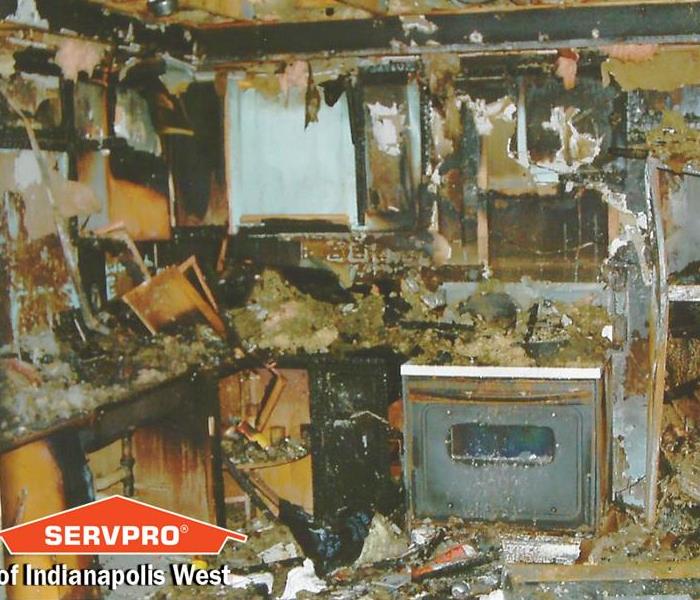Archived Fire Damage Blog Posts
Fire Prevention Week: Protecting Your Home with SERVPRO of Indianapolis West
10/8/2024 (Permalink)
As Fire Prevention Week approaches, running from October 8 to October 14 this year, it’s the perfect time to reflect on the importance of fire safety and prevention. This annual observance, established to commemorate the Great Chicago Fire of 1871, serves as a crucial reminder to take proactive measures to protect our homes and loved ones from the dangers of fire.
The Importance of Fire Prevention
Fire prevention is not just about having smoke detectors and fire extinguishers—it's about creating a comprehensive safety plan. According to the National Fire Protection Association (NFPA), home fires are more common than many realize, and they can escalate quickly. Understanding the risks and implementing preventive measures can save lives and protect property.
Tips for Fire Safety
Install Smoke Detectors: Ensure smoke detectors are installed on every level of your home and in sleeping areas. Test them monthly and replace the batteries at least once a year.
Create an Escape Plan: Develop a fire escape plan that includes two ways out of every room. Practice this plan with your family regularly.
Maintain Electrical Systems: Check your electrical systems for frayed wires and overloads. Hire a licensed electrician for any repairs or upgrades.
Safe Cooking Practices: Never leave cooking food unattended, and keep flammable materials away from stovetops and ovens.
Store Flammable Materials Properly: Keep gasoline, propane, and other flammable liquids in approved containers, stored away from living spaces.
SERVPRO of Indianapolis West: Your Fire Restoration Partner
At SERVPRO of Indianapolis West, we understand that even with the best prevention measures, accidents can still happen. If you experience fire damage, our team is here to help you recover quickly and efficiently.
Our Fire Damage Restoration Process:
Emergency Contact: Once you reach out to us, we’ll respond promptly to assess the situation and begin the restoration process.
Assessment: Our trained professionals will evaluate the extent of the fire damage and create a tailored plan for recovery.
Board-Up and Tarping: We will secure your property to prevent further damage from weather or unauthorized entry.
Water Removal and Drying: If water was used to extinguish the fire, we will remove excess water and thoroughly dry the affected areas to prevent mold growth.
Smoke and Soot Removal: Our team will clean and deodorize all affected surfaces, restoring your home to its pre-fire condition.
Final Restoration: We handle the repairs and restoration needed to return your home to its original state, ensuring a seamless recovery.
This Fire Prevention Week, take the time to evaluate your fire safety practices and make any necessary adjustments. By following safety tips and having a plan in place, you can significantly reduce the risk of fire in your home. If the unexpected does occur, remember that SERVPRO of Indianapolis West is just a call away. We are dedicated to helping you navigate the recovery process and restore your peace of mind.
Stay safe, and let’s work together to ensure a fire-free environment for our community!
How to Effectively Use a Fire Extinguisher
9/10/2023 (Permalink)
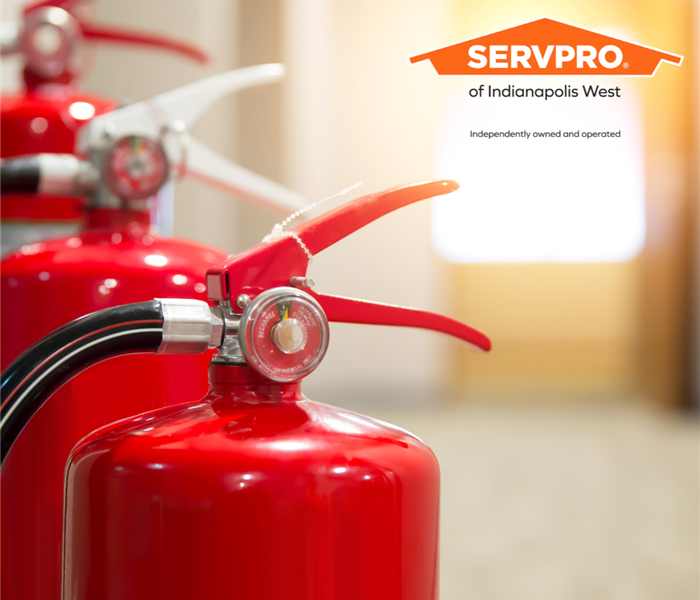 Using Fire Extinguishers Effectively
Using Fire Extinguishers Effectively
Having easy access to a fire extinguisher in your home or workplace is a vital safety measure. However, it's equally important to know how to use one and understand which types of fires they are effective against.
A fire extinguisher can play a crucial role in preventing the spread of fire and smoke damage within your City and Indianapolis West residence or office. In the unfortunate event of a fire, remember that SERVPRO of Indianapolis West is here with compassionate experts to assist you in the cleanup process.
The Occupational Safety and Health Administration (OSHA) offers valuable training tips (see below). If you ever have doubts or concerns, always prioritize your safety by leaving the premises and dialing 911 once you are safely outside.
SERVPRO of Indianapolis West wants to ensure you are aware that you can attempt to combat a small fire only under the following conditions:
- You have the right class of fire extinguisher.
- You know how to use the fire extinguisher.
- You can access the fire extinguisher quickly. Remember, fire spreads rapidly, and fire damage and smoke damage are far less concerning than injuries to yourself or others.
Types of Portable Fire Extinguishers:
- Class A Fire Extinguishers: Suitable for fires involving cardboard, paper, wood, and dried vegetation.
- Class B Fire Extinguishers: Effective against fires fueled by flammable and combustible liquids such as gasoline, diesel, oil, oil-based paints, and various solvents.
- Class C Fire Extinguishers: Designed for fires involving appliances, tools, or equipment that is electrically energized, as well as fires in close proximity to electrically-energized equipment.
- Class D Fire Extinguishers: Intended for extinguishing fires caused by combustible metals like magnesium or sodium (not ordinary carbon steel).
- Class K Fire Extinguishers: Specifically designed for kitchen fires involving cooking oils and greases, including vegetable and animal-based oils and fats.
Remember, fire safety is a shared responsibility, and knowing how to use a fire extinguisher properly is an essential skill for everyone's safety.
Kitchen Fire Damage Prevention
9/2/2022 (Permalink)
 Fire and smoke can have damaging effects on your property. Take these precautions to help prevent kitchen fires.
Fire and smoke can have damaging effects on your property. Take these precautions to help prevent kitchen fires.
SERVPRO of Indianapolis West understands the importance of keeping families and loved ones safe. According to the NFPA, “House fire claims over the five years have caused $6.9 billion in property damage.” SERVPRO of Indianapolis West is dedicated to being a resource in Indianapolis. We want to make sure that our community is taking all the precautions necessary to prevent house fires. The following are tips to avoid fire damage in the kitchen.
Kitchen Fire Damage Safety
- When cooking food, stay at home and keep an eye on it.
- Keep children away from the kitchen when you are cooking
- Avoid food and grease buildup on cooking surfaces
- Solvents and flammable cleaners should be kept away from hot surfaces.
- Never store fuel in your home or business.
- Check that no electric cords from your appliances are hanging from the counters.
Smoke Detectors
- Replace smoke detectors every six months.
- Check the status of your smoke alarms.
- Plan a fire escape strategy for family members including pets.
In the event of fire or smoke damage, please contact SERVPRO of Indianapolis West to help restore your home or property. Our certified technicians focus on helping you restore your home to the pre-fire condition you know and love. If you have any questions about what we do after fire damage or need help recovering from a fire damage incident in Indianapolis, call us at (317) 243-3149.
SERVPRO of Indianapolis West Emergency Fire and Water Damage
9/2/2021 (Permalink)
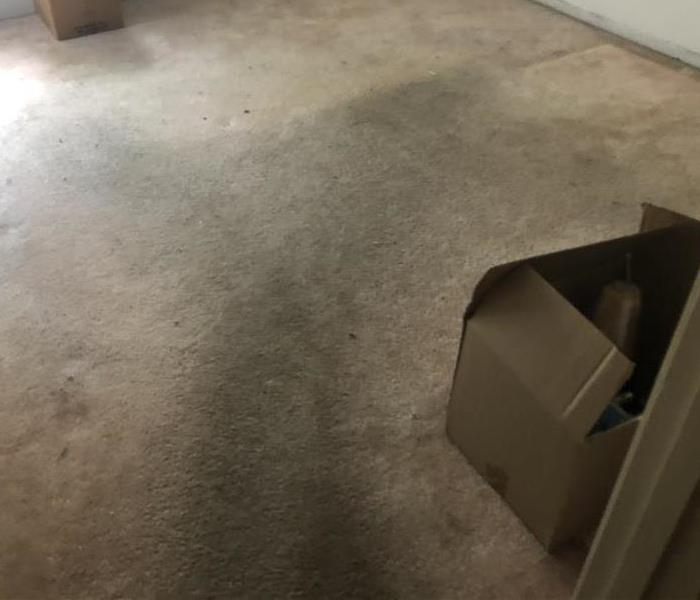 SERVPRO of Indianapolis West
SERVPRO of Indianapolis West
Dealing with the aftermath of emergency fire damage restoration can be extremely stressful especially when soot has made its way through your house and completely covered all of your belongings.
SERVPRO of Indianapolis West is trained and licensed to give you an optimal experience as we care for your residential or commercial property as your SERVPRO of Indianapolis, independently owned and operated location. It should be known that soot restoration is one of the most difficult aspects of a house fire as it can be very damaging.
According to the National Fire Protection Agency (NFPA), three of every five home fire deaths could have been prevented.
Most fatal fires happen when families are asleep giving them less than adequate time to escape. A smoke alarm stands guard around the clock, and when it first senses smoke, it sounds a shrill alarm. Smoke alarms are crucial elements in the early detection of fires.
National Fire Safety is important all year round and while the main focus is preventing residential fires, our team here at SERVPRO of Indianapolis West would like to remind everyone this is a great time to revisit workplace fire prevention & safety.
Below are 12 tips to ensure a fire-safe workplace:
Step 1. Get Organized– Practice good workplace housekeeping. Clutter contributes to fires by providing fuel and by preventing access to exits and emergency equipment.
Step 2. Designated Smoking Areas – Smoke only in designated areas and extinguish smoking materials safely. Never smoke in storerooms or chemical storage areas.
Step 3. Fire Extinguishers – Maintaining the appropriate type and number of fire extinguishers and learn how to properly use a fire extinguisher.
Step 4. Electrical Hazards – Report all electrical hazards. Many fires start in faulty wiring and malfunctioning electrical equipment.
Step 5. Access to Control Panels – Electrical control panels need to have free access maintained so that the electric could be shut off easily.
Step 6. Maintenance – Maintain machinery to prevent overheating and friction sparks.
Step 7. Sprinkler Systems & Smoke Detectors – Never block sprinklers, firefighting equipment or emergency exits. Observe clearances when stacking materials. Testing of sprinkler systems and smoke detectors at least annually.
Step 8. Chemical Safety – Use and store chemicals safely. Read the label and the Material Safety Data Sheet to determine flammability and other fire hazards. Provide adequate ventilation when using and storing these substances.
Step 9. Waste Control & Storage – Control the accumulations of flammable and combustible waste materials and residues so that they do not contribute to a fire emergency.
Step 10. Prevent Ignition – Use all precautions to prevent ignition in potentially explosive atmospheres such as those containing flammable liquid vapors or fine particles. Use non-sparking tools, and control static electricity as required.
Step 11. Exits – Emergency exit diagrams should be posted and emergency exits should be well lit with neon-regulation signs.
Step 12. Contact Info – Employees should have a list of emergency contact phone numbers in case of emergency. Remember that people will often panic in an intense situation; therefore basics such as the company address, phone number and floor plan should be posted.
Planning to ensure fire protection and safety is key to avoiding unwanted fire issues.
Residential and Commercial Fire Clean Up
Soot can be one of the hardest parts of fire restoration clean up and is developed through three different methods:
· Wet soot residue—results from smoldering, low-heat fires. This residue is sticky, smeary, and has a very pungent odor.
· Dry soot residue—results from fast-burning fires with high temperatures. This residue is typically dry, powdery, and non-smeary.
· Protein residue—almost invisible but can discolor paints and varnishes in your home. This residue also has an extremely pungent odor.
Each type of soot is different and requires specific expertise to clean for such needs or concerns.
Our fire repair process is outlined online for your review.
Call us at SERVPRO of Indianapolis West , your SERVPRO of Indianapolis, faster to any size disaster, for all your fire and restoration needs.
Dealing with the aftermath of a house fire in Indianapolis.
6/29/2021 (Permalink)
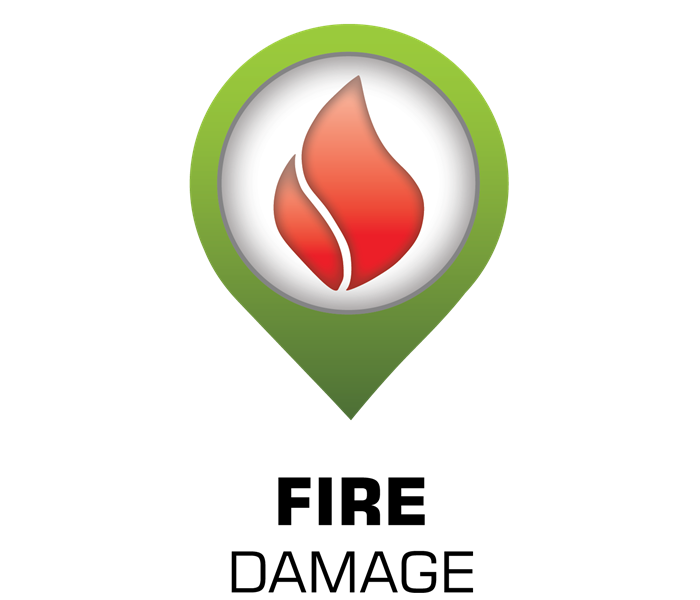 SERVPRO of Indianapolis West
SERVPRO of Indianapolis West
Dealing with the aftermath of a house fire in Indianapolis can be extremely stressful especially when soot has completely covered your belongings. It should be known that fire damage cleanup is one of the most difficult aspects of a house fire.
In the event of a fire in your home, be sure to call your local Indianapolis fire department first. Your focus should always be safety first. Once you and your family are safe and secure reach out to your insurance agent to see if an insurance claim is necessary.
This is when you call us at SERVPRO of Indianapolis West. Your family is safe, your insurance has been reviewed, and now you need a fire restoration company.
Soot can develop through three different methods:
- Wet soot residue results from smoldering, low-heat fires. This residue is sticky, smeary, and has a very pungent odor.
- Dry soot residue results from fast-burning fires with high temperatures. This residue is typically dry, powdery, and non-smeary.
- Protein residue is almost invisible but can discolor paints and varnishes in your home. This residue also has an extremely pungent odor.
Each type of smoke damage restoration is different and requires specific expertise to clean. You need a fire restoration company, our team here at SERVPRO of Indianapolis West. We are highly trained in smoke, fire and water cleanup and restoration and can assist in all aspects. We consider everything we need to clean and what our plan is moving forward.
Structural Cleaning - After a smoke or fire damage, ceilings, walls, woodwork, carpeting and floors will often need a thorough cleaning. Our team here at SERVPRO of Indianapolis West will walk your property to determine the extent of damage. We will use specific equipment and cleaning products for the different types of surfaces and products found within your structure.
Depending on the amount of soot, we can lower the cost of cleaning if lighter soot deposits are found. We can also see if the expense can be lower with repainting or refinishing. If this is not the case, we will clean to prepare for painting. This process deodorizes and ensures the new paint will adhere properly to the surface.
Contents Cleaning - All the restorable contents in affected areas will be professionally cleaned and deodorized. This includes area rugs, furniture, draperies and upholstery. Our team will begin by carefully inspecting and testing all fabrics to determine which cleaning methods are most appropriate.
Both wet and dry-cleaning services can be provided as we deodorize and restore contents to preloss condition. This process would include electronics, art, wood furniture, kitchen items, clothing, bedding and much more. Finally, we can provide an inventory list of all "to be claimed" items if so requested.
Deodorization - SERVPRO of Indianapolis West provides specialized services that rid your home or place of business of offensive odors left by fire or smoke damage. We do not cover up lingering odors with a fragrance. As we seek out the sources of the odor and remove them. Ask us to explain the various methods available and which will work best for you.
No matter how difficult or hard you find your situation to be, we can help. Find your fire restoration near me with SERVPRO of Indianapolis West to help restore your home and bring it back to pre-damage conditions.
Protecting your Home from Further Soot Damage
4/30/2021 (Permalink)
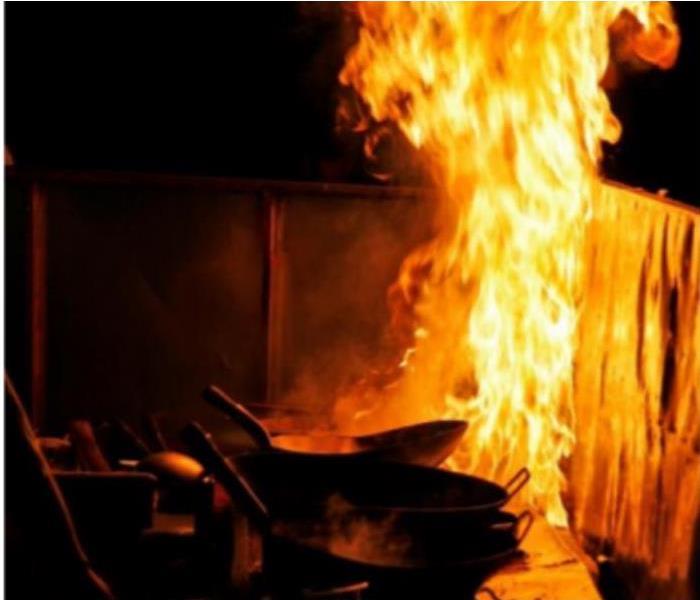 SERVPRO of Indianapolis West is here to help with all your fire restoration needs.
SERVPRO of Indianapolis West is here to help with all your fire restoration needs.
Dealing with the aftermath of fire damage can be extremely stressful especially when soot has made its way through your house and completely covered all of your belongings. SERVPRO of Indianapolis West is trained and licensed to take the utmost care of your property and explain the potential issues you may experience. It should be known that soot restoration is one of the most difficult aspects of a house fire as it can be very damaging.
Soot can develop through three different methods:
- Wet soot residue—results from smoldering, low-heat fires. This residue is sticky, smeary, and has a very pungent odor.
- Dry soot residue—results from fast-burning fires with high temperatures. This residue is typically dry, powdery, and non-smeary.
- Protein residue—almost invisible but can discolor paints and varnishes in your home. This residue also has an extremely pungent odor.
Each type of soot is different and requires specific expertise to clean, call us at SERVPRO of Indianapolis West for such needs or concerns. It is our duty to serve our customers and help make it “Like it never even happened.”
According to the National Fire Protection Agency (NFPA), three of every five home fire deaths could have been prevented as they were the result of a lack of smoke alarms (38%) or broken smoke alarms (21%). Most fatal fires happen when families are asleep giving them less than adequate time to escape. A smoke alarm stands guard around the clock, and when it first senses smoke, it sounds a shrill alarm. Smoke alarms are crucial elements in the early detection of fires.
Make sure to revisit your smoke alarms and review documented statistics from the NFPA through their The Smoke Alarm Effect article.
Reach out to us at SERVPRO of Indianapolis West for more information on fire damage restoration.
Fire Risks and Prevention at Home and at Work
2/24/2021 (Permalink)
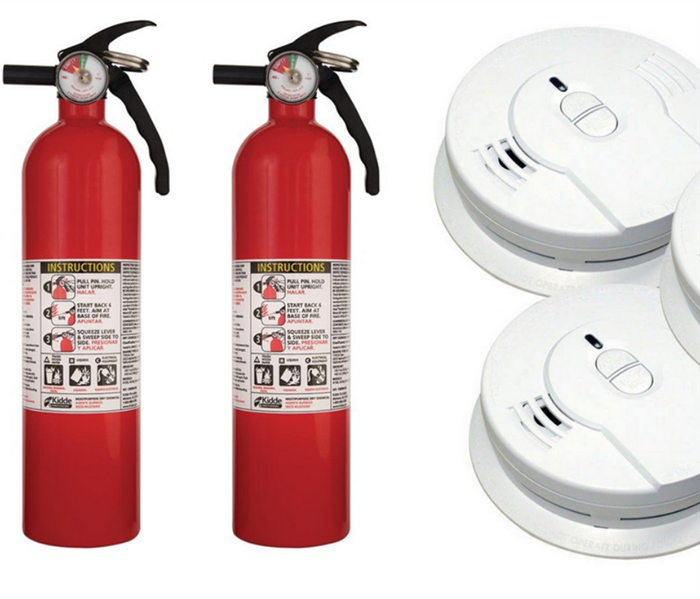 Always be prepared for the unexpected.
Always be prepared for the unexpected.
Structure fires are dangerous, even sometimes deadly, and can cause thousands of dollars in damage to homes and businesses. The cold winter months often lead to spikes in fires due to alternate heating methods.
The heat created by the flames is just one of many dangers. Smoke inhalation, fumes, and vapors are also responsible for causing life-threatening damage to people and pets. The heavy smoke will reduce visibility and make it difficult for people to escape the flames.
Luckily, many of these accidents can be avoided through fire prevention and fire safety practices. It's essential to follow home and workplace safety plans. Learning how to prevent fires in your home or business is critical to avoid dangerous situations that could put you at risk.
Know the Fire Hazards in Your Workplace
Whether it's paper, cardboard boxes, or other flammable materials, it's common to have them in your office building. However, these materials can act as a significant source of fuel to a fire if they ignite. That's why you should always keep things clean and orderly.
If you work with combustible and flammable liquids/vapors, then you'll want to be extra cautious when it comes to the storage and safety of your building. If you're using a defective extension cord or plugging too many devices into a single outlet, you could overload that circuit. By overusing the power socket, it could overheat and potentially ignite a fire. That's why you should always ensure that you only use one plug per socket.
Know the Fire Hazards in Your Home
Addressing fire hazards in your home is very important in preventing fires before they happen. Being aware of at-risks areas in your home enables you to know where you should be extra cautious.
Kitchen fires are one of the most common fires in homes. To reduce the risk of fire, never leave anything cooking or baking unsupervised. When frying, grilling, or cooking, keep dish rags and other flammable materials away from the stove. If you are cooking with oil, be careful not to splash or spill the oil near the burners as it can quickly flame up. It's essential to have a working fire extinguisher you can easily access when a fire starts while cooking.
Dangers of Space Heaters
Many people use space heaters to heat their homes or warm areas that lack sufficient heat, like a bathroom or spare bedroom. Electric space heaters can help warm a room quickly. However, they can be as dangerous as convenient if misused. Never use an extension cord or power strip with space heaters. Always plug them directly into a wall outlet. Space heaters pull a lot of power and can quickly overheat a power strip or extension cord resulting in a home fire.
Install Smoke Alarms at Every Level
It's a well-known fact that smoke alarms save hundreds of lives every year. Properly installed smoke alarms should be installed on every level of a home, including the basement. Smoke alarms should be tested monthly, and batteries replaced yearly, or as soon as you hear a low-battery warning which usually sounds like a "chirping" noise.
Beyond installing one on every level and in every bedroom, you should also consider installing smoke alarms in areas at higher risk of fire. These higher fire risk areas include the laundry and furnace room.
Practice a Fire Escape Drill with Your Family
It's essential to have a fire escape plan for your family or coworkers and practice it regularly. Practice what to do if a fire should occur in different areas or levels of your home or business. To increase your odds of safety in the event of a fire, you need more than one escape plan. Your plan may include exiting through doors or climbing out through windows. When planning and practicing a fire escape plan, you also need to designate a meeting place outside the home or office where everyone will meet.
What to Do If a Fire Should Occur
Even a small fire can cause extensive damage to a home. Sometimes a small fire may not generate large flames that burn objects, but the resulting smoke can quickly spread throughout the structure. The migrating smoke and soot causes damage to furniture, clothes, electronics, carpets, and more.
If you have a fire in your home or business, call the fire and smoke damage restoration experts of SERVPRO of Indianapolis West. We will work right away to identify the steps to clean and restore your property while taking measures to prevent any unnecessary further damage from occurring. Click here, or call SERVPRO of Indianapolis West at 317-243-3149, and we will make it "Like it never even happened."
After The Fire
1/13/2021 (Permalink)
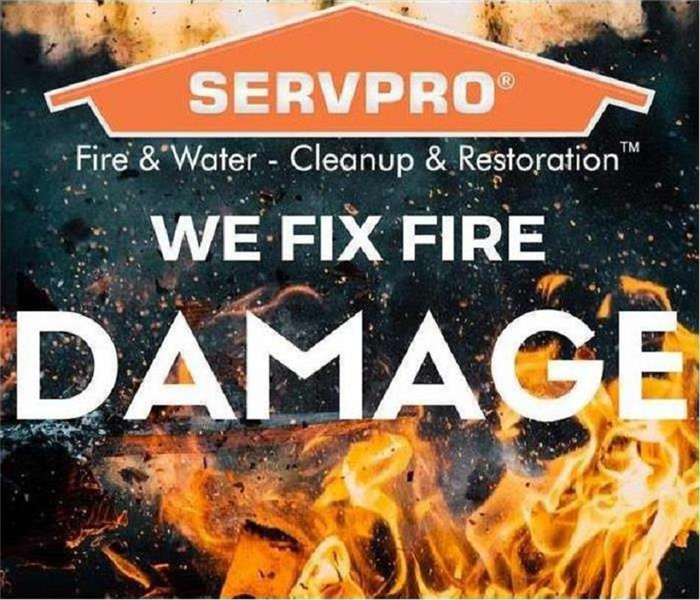 Let SERVPRO of Indianapolis West fix your fire damage, and make it "Like it never even happened."
Let SERVPRO of Indianapolis West fix your fire damage, and make it "Like it never even happened."
When you can re-enter your home, make sure that you focus on retrieving valuables such as money, jewelry, and essential paperwork such as birth certificates, medical records, and passports. Only bring out prescription medications so that you can get replacements. Don't take medicines from a burned house.
Board-Up
This board-up process is essential to keeping your property safe. There may be damage to the structure's exterior in many home fire situations that would cause the outside elements, like rain, to get inside. The roofs and windows are often vented to help the fireman control the flames and to exhaust the house of smoke. We will first board-up any windows or doors and cover any roof damage with plywood and tarps to keep the outside elements from causing further damage to your home.
Mitigation Process
"Mitigation" means to reduce the severity of the damage. The fire department will investigate the fire's cause and origin, and your insurance company often does the same. Initial mitigation services are often on-hold until the cause and origin have been determined not to disturb the scene. After the fire department and the insurance company allow us to begin, we can start the mitigation process. This stage of the process is where we remove the water from the fire department, carpet and padding, and possibly wet drywall that may be sagging. It's important to winterize the structure to keep pipes from freezing in some cases.
Estimating and Pretesting
Before the cleaning and restoration begin, a complete estimate will need to be produced. The estimate will outline everything that needs to be done to both the structure and your belongings to return them to their preloss condition. Pretesting surfaces and content helps us identify the best cleaning methods and chemicals to use. This step is crucial to developing a plan of action.
Call the Service Professional
Cleaning and restoring homes and businesses is not an easy thing to do. SERVPRO has over fifty years of experience in the restoration industry, and we have advanced techniques and equipment to restore your property correctly. You'll want to hire a professional restoration company like SERVPRO of Indianapolis West. We are always open, 24/7/365, to respond to your call. We understand the importance of an immediate response to a fire damage call.
If you should suffer fire and smoke damage to your Indianapolis or commercial, contact the fire damage restoration pros at SERVPRO of Indianapolis West. We have the knowledge and experience to clean up and restore fire and smoke damage. Day or night, 24/7, we are ready to answer your call. 317-243-3149
Another Day At The Office? No, Not Really.
10/23/2020 (Permalink)
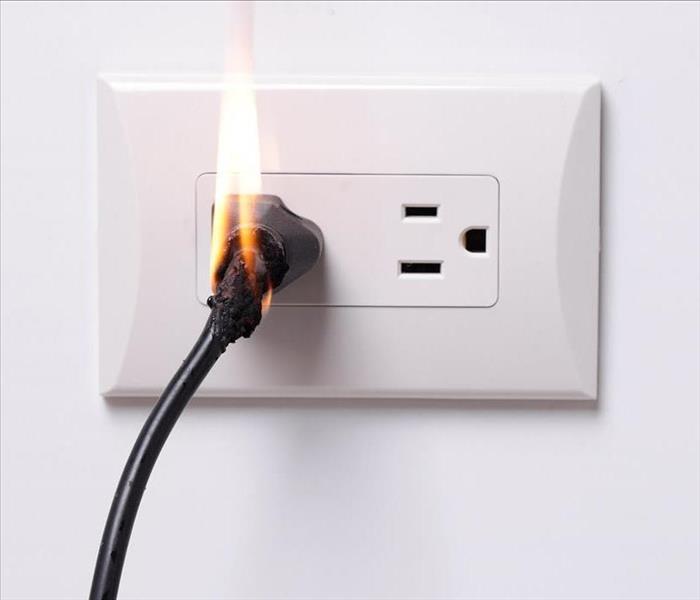 Call SERVPRO of Indianapolis West if you need residential or commercial fire cleanup and restoration.
Call SERVPRO of Indianapolis West if you need residential or commercial fire cleanup and restoration.
Imagine this. You head off to work just like any other day, and about lunchtime, you get a call from your neighbor saying that there are several fire trucks in front of your house, and he thinks your home is on fire. You bolt out of the office as fast as you can, worrying terribly about your family all the way there. Luckily, the kids had gone off to school, and no one was home.
This is precisely what happened to one of our former customers. An electrical fired occurred while they were at work. Fortunately, the fire department arrived quickly and contained the fire to just the downstairs living room. What a complete nightmare to have a fire happen, and now your home is full of smoke, soot, and water and smells terrible.
Fire and Water Damage is our specialty.
House fires are more common than you may think. They happen somewhere every day in Indianapolis. Some of these fires are contained quickly and extinguished by the homeowner, while others get much larger and do way more damage. Fire damage cleanup and restoration is our specialty and is something we see and deal with every day.
With this smaller electrical fire, there was not that much material that burned; it was mostly smoke and water damage. Our crews were able to clean and restore all of the homeowner's personal belongings onsite while cleaning and repairing the structure. It's often better to remove the contents to a safer environment while the house is being cleaned and repaired. We didn't need to do that in this case because there was not very much demolition needed or fire damage to the home.
Sometimes a fire does so much damage that the home or business is a total loss. Some fires cause so much damage that a complete demolition is required down to the frame and then rebuilt with all new building materials. Luckily, that's not the case for this family. They stayed with some of their family while we made it "Like it never even happened," to their home.
Call Us For Help
We hope you never have to experience a fire at your home or business. But if you do, no matter how small or big the damage is, SERVPRO of Indianapolis West can help with the cleanup and restoration. We have the experience and tools to quickly help return your home and your life back to normal. If disaster should strike your Indianapolis home, call us at 317-243-3149 or click here.
Don't Battle A Fire On Your Own
7/29/2020 (Permalink)
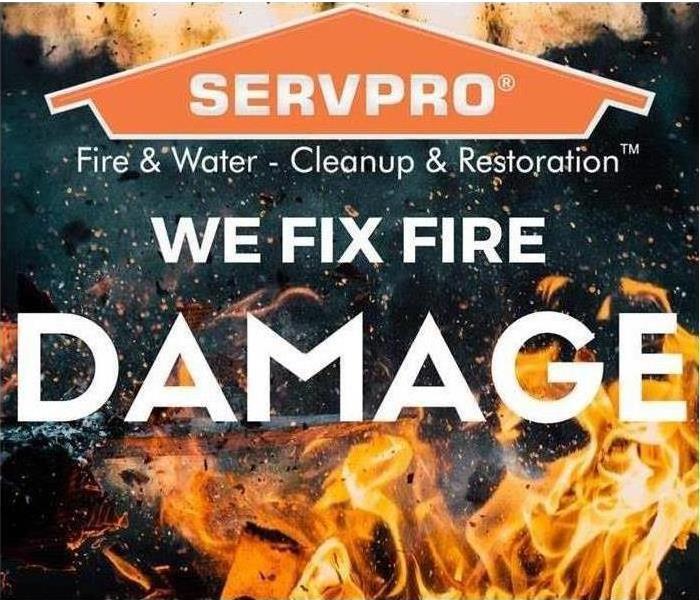 Call SERVPRO of Indianapolis West and we will make it "Like it never even happened." 317-243-3149
Call SERVPRO of Indianapolis West and we will make it "Like it never even happened." 317-243-3149
Homeowners don’t usually know where to start and what to do after experiencing a fire emergency for the first time. Most people never have to go through the hardship of having a fire destroy or damage their home or business. But those who do understand the difficulty and challenges a fire can bring. SERVPRO of Indianapolis West will help you get back the life you had before the flames took control.
Relocating Short-Term
Most often, even a small fire will displace the family from their home. The smoke and soot residue is dangerous and usually covers everything inside the house. The smoke moves throughout the structure and blankets all of the contents.
Even if the fire was contained and put out relatively quickly, hot smoke migrates to colder areas around the home and can affect other property levels. Smoke can travel through plumbing systems, pipes and go up several stories.
Living with family members or renting short-term is the best way to proceed after fire damage. Removing your family from the dangerous environment allows SERVPRO of Indianapolis West to thoroughly clean and restore your home.
Contents Restoration
Taking care of your home and your belongings is critical. Usually, it is best to carefully pack all contents and move them to our warehouse, where they are inventoried, cleaned, and restored. We keep them safe until the home is ready, then transfer them back for you. This allows for better access to clean and restore the house and eliminates secondary damage during the restoration process.
Structure Restoration
We will remove and replace any part of the structure that was burned or damaged beyond the point of restoring. Our technicians carefully clean the walls, ceilings, and floors to remove and smoke and soot. The furnace and A/C unit will need to be cleaned thoroughly and ductwork inside the walls.
Call SERVPRO of Indianapolis West
If you should suffer a house fire, call the fire cleanup experts at SERVPRO of Indianapolis West, 317-243-3149, for 24-hour emergency service. At SERVPRO of Indianapolis West, we have specialized equipment, professional training, and certifications that allow us to restore your home to its pre-fire condition.
Fire in Your Indianapolis Home or Business
6/23/2020 (Permalink)
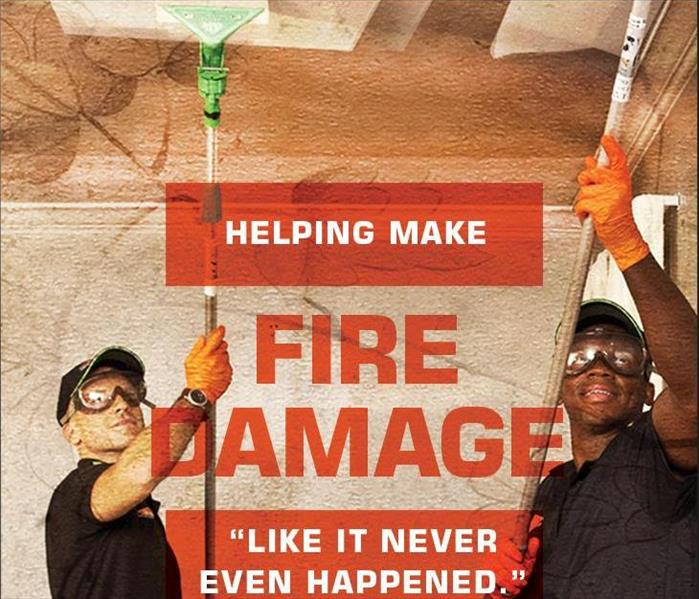 If you experience a fire damage SERVPRO of Indianapolis West has the knowledge and experience to fully restore your property.
If you experience a fire damage SERVPRO of Indianapolis West has the knowledge and experience to fully restore your property.
Pretesting Before We Clean
We carefully inspect and test all the rooms of your property and contents to determine the extent of the fire, smoke, and soot damage. This step is crucial to developing a plan of action. Pretesting surfaces and contents help us identify the best cleaning methods and chemicals to use.
There are several different types of smoke and soot, and each needs its own cleaning process. Wet smoke, dry smoke, and protein smoke are the most common types in home fires. Determining the type of smoke before the cleanup process starts gives our fire restoration specialist the information to create the right plan of action.
What Is Salvageable
During the initial inspection, we look for damaged items and make a list in each room. If items were in direct contact or too close to the heat source, they might not be restorable. We will begin pretesting the structure and all of your belongings for restorability, working from the source of the damage outward.
Our "restore vs. replace" mentality means we hope to repair and restore your property its original condition. Unfortunately, that is not always the case if items are heavily damaged by fire and heat. We will separate and save any items which do not clean completely. Our crews will never throw anything out unless you request it.
We understand that the belonging in your Indianapolis home or business are not just contents; they are precious family heirlooms and what makes your house a home. Cleaning and restoring your house and your belongings is our number one priority. This keeps restoration costs down, saves you money, and preserves precious heirlooms that can't be replaced.
An excellent way to help protect your items is to remove them from the fire environment to a clean and safe place. When necessary, our crews carefully remove all contents and move them to our warehouse where they are inventoried, cleaned, and restored. This allows for better access to clean and restore the home and eliminates the possibility of secondary damage during the restoration process.
What Has To Be Removed
In most cases, we remove any wet materials like carpet and drywall that got wet from the fire fighting efforts. Not all of the drywall needs to be removed after a fire occurs. Most walls can be cleaned, sealed, and then painted to return them to preloss condition.
If the walls received substantial amounts of water and fire damage, they would need to be removed and replaced with new drywall. Sometimes, it is possible to open just small areas of the wall and force air into them to dry the area properly.
Our experts will extract the water from your home, treat any damp areas to prevent mold from growing, and employ industrial drying fans and dehumidifiers to remove all the moisture from inside your home.
Call The Cleanup Pro's
We are always open, 24/7/365, to respond to your call. We understand the importance of an immediate response to a fire damage call. We can handle any size job from a small kitchen fire to a high-rise building in Downtown Indianapolis. Our fire damage restoration technicians have the training and expertise to make it "Like it never even happened." Our mission is to return your property to its preloss condition as quickly as possible and help get your life back to normal before the flames.
You can contact us here, or call us directly at 317-243-3149. Remember that we are always open and ready to help you. We hope you never need us, but if you experience a fire rest assured that our team of highly trained fire damage restoration technicians will treat your family with empathy and respect and care for your property.
Fire Damage Restoration Tips for Indianapolis Homeowners
4/26/2020 (Permalink)
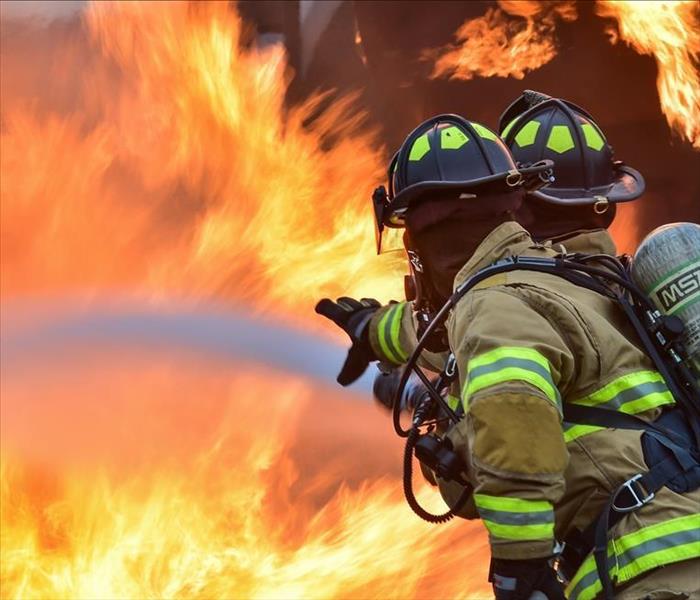 Fire Damage Restoration Tips for Indianapolis Homeowners
Fire Damage Restoration Tips for Indianapolis Homeowners
It doesn’t take much for a fire to start. Every day, fires occur in homes across Indianapolis. Fires can start from faulty appliances, lightning, cooking, or forgetting to blow out a candle before leaving a room. If a fire should happen at your home, below are some tips to remember to keep you and your family safe and to make the cleanup and restoration process go smoother and quicker.
Don’t Enter Home Immediately After a Fire
Even a little tiny house fire can result in dangerous conditions in your home. A fire can cause damage to the home’s structure that could lead to a ceiling, wall, or floor collapsing and hurting someone. If the fire was put out with water, there could be a risk of electrical shock. Also, depending on what burned, there could be harmful vapors or residue left in the home. Don’t enter your home immediately after a fire until the fire department has given the all-clear. The firefighters will make sure all of the fire is extinguished and that there is no danger to entering the home. If there is danger, they may not let you enter or they may cordon off certain areas of your home that may be dangerous.
Secure Sensitive Documents
Once you are allowed to enter your home after a fire, it’s important to secure any sensitive documents or items. These can include birth certificates, social security cards, insurance papers, financial documents, valuable jewelry, gold, and coins. If you have to move out of your home due to the fire, you want to secure anything that you wouldn’t want to lose especially if your home is vulnerable to thieves and vandals as a result of the fire. If you don’t already have a small fire safe to store sensitive documents and valuables, you may want to invest in one. A fire safe will keep these documents safe if a fire should happen.
Contact a Fire Damage Restoration Company
While you may want to start cleaning up right away, it’s best to call a fire damage restoration company, like SERVPRO of Indianapolis West. They can quickly assess the damage and determine the best way to clean up and ultimately restore your home. They also have years of experience working with insurance companies and will know what to do to make the process smoother and easier for you. The reason why you don’t want to start cleaning is that you could be creating more damage by using the wrong cleaning solutions and/or equipment.
Extract the Water & Dry Damaged Rooms
One of the first steps a fire damage restoration company will do is to extract the water that the fire department used to put out the fire if they used water. Some times with smaller fires, they may just use extinguishers which can contain powders, water, or other agents that will also need to be cleaned up. Once the water has been extracted, there still may be moisture in the air and seated deep into carpet pads and porous surfaces. The moisture is usually removed with commercial blowers and dehumidifiers. The reason it is so important to remove the water and dry out the damaged areas is to prevent mold from growing and creating further damage. The professional fire restoration company may also use products and equipment to keep mold from occurring.
Do Not Throw Anything Away - Wait for Insurance Adjuster
Do not move anything or throw anything out or clean up anything until your insurance company has seen the damage. They will usually show up on-site to assess the damage and work with the restoration company to determine what damage is covered and what steps to take. If you do have to throw anything out or move anything, take lots of pictures of all of the damage before you or the restoration company touches anything. It’s usually a good idea to call your insurance agent right away after a fire to ensure you follow the right steps and do the right thing to make sure they cover your claim.
Save the Salvageable
Once you have been given the clear by your insurance company to proceed with the cleanup, you will want to save anything that is salvageable. The experts at SERVPRO of Indianapolis West can help determine what can be cleaned up and what isn’t salvageable. Your insurance company agent or adjuster can also give insight into what is not salvageable and whether it is covered under your insurance to replace. You may be surprised what can be saved, so it’s important to ask the fire restoration pros at SERVPRO of Indianapolis West before tossing anything. They have specialized equipment and tools that can clean up some household items.
When it Comes to Home Fires, SERVPRO of Indianapolis West Can Help
We hope you never have to experience a fire at your home. But if you do, no matter how small or big the damage is, SERVPRO of Indianapolis West can help with the cleanup and restoration. We have the experience and tools to quickly help return your home and your life back to normal. If disaster should strike your Indianapolis home, give SERVPRO of Indianapolis a call 24/7.
How to Prevent House Fires
2/26/2020 (Permalink)
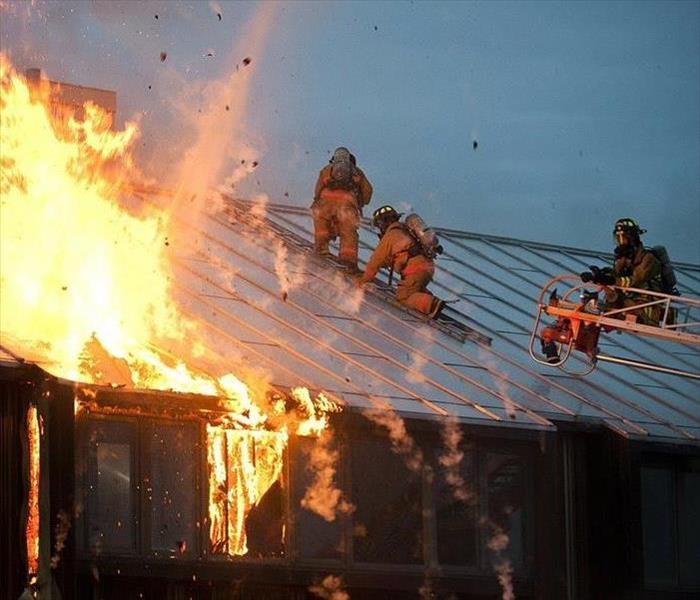 How to Prevent House Fires in Indianapolis
How to Prevent House Fires in Indianapolis
One of the most damaging disasters that can happen to a home is a house fire. A house fire can cause extensive damage from the fire, the smoke, and the water to put it out. After a fire, you could be dealing with fire damage, water damage, and possible mold damage. If you should suffer from a house fire, call the restoration experts at SERVPRO of Indianapolis West to quickly and effectively repair and restore your damaged home.
In today’s post, we will cover how to prevent house fires from happening in the first place. We will also go over how to prepare your home and your family in the event a fire should happen. There many things a homeowner can do to reduce the risk of a fire from happening in the first place.
Install Smoke Alarms and Test Them Monthly
The NFPA recommends that smoke alarms be installed on every floor and inside every bedroom. To reduce false smoke alarms, you will want to make sure the smoke alarm in the kitchen area is 10 feet away from the stove and cooking appliances, like a toaster. It’s important to test all of your smoke alarms once a month to make sure they are in operating condition.
Keep Your Dryer Vents Clean and Clear
Fires can happen very quickly from clogged or obstructed dryer vents. It’s important to clean out the lint trap after each use of the dryer. The lint from a dryer is highly combustible when exposed to the high heat of an operating dryer. You also want to check for lint or clothes that have fallen behind or beside the dryer as they can increase the risk of fire. It’s also a good practice to vacuum underneath the dryer and inside the dryer vents and ducts at least once a year.
Create a Fire Escape Plan With Your Family and Practice It
If a fire should happen, does your family know what to do? Due to the materials a home is constructed of and the materials of the furnishings, house fires can spread much more faster than they did just a decade ago. The smoke from the fire is also much worse which is why it is important to have an escape plan and practice it on a regular basis. Ideally, you want to be able to get out of your home safely within 30-seconds.
Keep Your Oven and Stove Top Clean
To reduce the risk of fires, it’s important to keep your oven and cooking surfaces clean. If you have food particles at the bottom of your oven, they can at the very least cause a lot of excess smoke to trip your smoke alarms and at the very worst, they can catch on fire and risk spreading outside the oven. Clean out the bottom of your oven on a weekly basis with a vacuum and clean the entire oven every 6-months to reduce the risk of fire. The cooking top can also be susceptible to fires due to a build-up of grease and oil from cooking. You should clean the cooking surface every time you use it to keep flare-ups from occurring. You also want to make sure that you keep any flammable items away from the stovetop. This can include curtains, cooking oil, napkins, wooden cooking utensils, and dish rags to name a few.
Ensure Family Knows Two Ways Out of Every Room
When practicing your fire escape plan, you should also make sure that every member of your household knows two ways out of every room if possible. In most instances, this would be the door and a window. If the windows are on the second floor, you could look into getting a ladder or rope to get down to the ground. Make sure everyone in your family knows to feel for heat before opening a door during a fire. If the door is really hot, then you will want to escape from the second way out if possible.
Contact the Fire Restoration Experts at SERVPRO of Indianapolis West
You can’t completely prevent house fires from occurring. If a house fire should happen at your Indianapolis home, it’s important to get out and ensure everyone is safe at first. Once the fire is out, the cleanup process begins. For fire, smoke, water and mold damage, trust the experts at SERVPRO of Indianapolis West. They are available 24/7 to respond quickly to any emergency. They have the knowledge and tools to quickly clean up and repair the fire damage to your home. If your home should suffer fire, smoke, water and/or mold damage, give SERVPRO of Indianapolis West a call.
House Fire
1/14/2020 (Permalink)
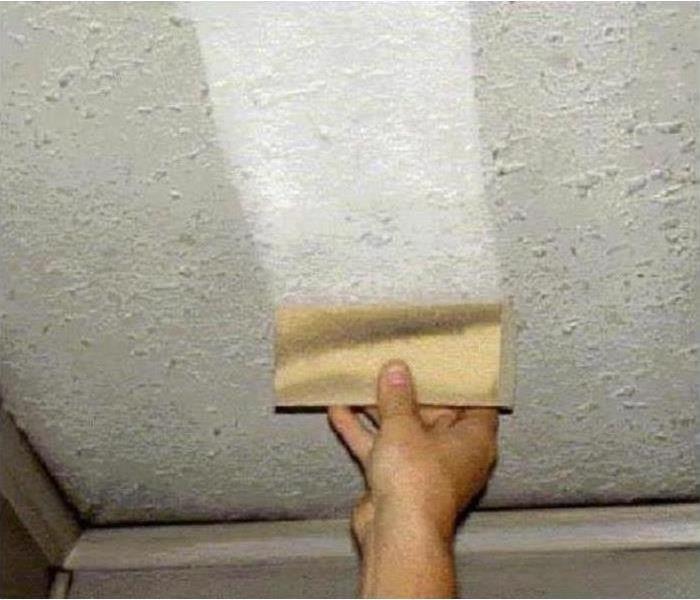 Smoke soot causes the most damage to structure after a fire.
Smoke soot causes the most damage to structure after a fire.
It's usually not the actual fire that does the most damage to a home. The smoke from the fire and the water from the firefighter's efforts are the two things that cause the most damage to a house after a fire.
Some house fires are small and extinguished quickly either by the homeowner or the fire department resulting in minimal damage from the flames. These fires that are put out very quickly still cause significant damage to the home as the smoke will migrate throughout the structure.
Even the smallest of home fires can cause extensive damage to a home. While the flames of a small fire may not cause much damage, the resulting smoke can quickly spread throughout the house, reaping significant damage to everything inside the home. This process is called secondary damage.
Secondary Damage
This is the damage created by the corrosive nature of substances released by the heat and fire. Often the secondary damages can account for the majority of damage to a home or business. To help protect the home and your belongings, we usually will need to empty the house of its contents. The term we use for this is a pack-out.
Pack Out
We carefully inventory all contents and safely pack them for a move to our secured warehouse. The contents of your home are thoroughly cleaned and restored, then returned after the structure restoration is completed. This allows for better access to clean and restore the house and eliminates the possibility of secondary damage during the restoration process.
Call The Pros
For contents cleaning and fire restoration, you can trust SERVPRO of Indianapolis West to get the job done right. If you should suffer from a house fire, it's crucial to call the fire and smoke damage restoration experts of SERVPRO of Indianapolis West immediately.
We will work right away to identify the steps to clean and restore your home while taking measures to prevent any unnecessary further damage from occurring.
How to Clean Up Smoke Damage After a Fire
10/24/2019 (Permalink)
 How to Clean Up Smoke Damage After a Fire
How to Clean Up Smoke Damage After a Fire
The worst part of most house fires isn’t necessarily the damage from the actual fire but the damage caused by the smoke and soot of the fire. Most house fires that are contained and put out quickly leave little to no damage. If the fire is in the oven or on the cooktop, the flames may cause damage to the oven, hood, and back wall. If replacing the oven or cleaning up the oven was the only thing needed, that wouldn’t be so bad. Unfortunately, it’s the smoke from the fire that can quickly spread that can leave lasting damage if not cleaned up properly.
In this blog, we will go over some tips to clean up “minor” smoke damage after a fire. We use the word “minor” because smoke damage can quickly turn into a much bigger problem as it spreads quickly. The other problem is that the homeowner may exacerbate the smoke damage by using the wrong cleaning supplies and chemicals. This leads us to the first tip.
Assess the Smoke Damage Before Cleaning
Once the fire has been safely put out, check the area for smoke damage. If you see that the smoke has gone up the walls and to the ceiling, it is usually best to call a professional to clean up. The reason is that it can be difficult to remove smoke from porous ceilings and walls. Also, if the smoke is visible on the ceiling and walls, there’s a good chance that it has been carried elsewhere. Fire damage restoration professionals will know where to look and how to clean the smoke damage. Also, smoke can easily slip behind appliances, through cracks, and other hard to reach areas which if not cleaned could leave that the smell of smoke lingering behind.
Air Out the Room
If you experienced a small kitchen fire, open the nearest window and/or door to let fresh air in. This will allow any airborne soot or smoke to hopefully blow out of the house. It’s also a good idea to turn off your central air or heat so the smoke isn’t sucked up into your air ducts. Once the smoke has dissipated and you’ve gotten plenty of fresh air circulating through the area, you can turn back on your central air or heat. It is, however, a good idea to check your air filter on your furnace and change it out if you smell any smoke from it. Another good idea is to use box fans to push the air out through your open windows and/or doors.
Clean Up the Fire Extinguisher Residue
If you use a fire extinguisher to put out the fire, you most likely used the common ABC dry powder fire extinguisher. It’s important to clean up the dry powder from any appliances or metals as the powder can be corrosive over time. A simple wet rag can remove the powder from any surfaces like an oven, sink, or refrigerator. Also with small kitchen fires, the powder probably spread further than the actual smoke damage, so you want to be thorough in examining all of the surfaces and areas around where the fire occurred.
Vacuum Up Any Fire and Soot Debris First
Before using towels and cleansers to wipe the surfaces, you will want to use a vacuum to remove any loose debris or soot from the damaged area. The debris could scratch surfaces like cooktops if using a towel to wipe the surface. Use the brush attachment of your vacuum to lightly dislodge any debris so the vacuum can suck it up. You make also want to use a broom to sweep up any debris but be careful not to use too much force as you could scratch the surfaces or make the stains worse.
Don’t Use Liquid Cleaners Just Yet
This is where most people would tend to grab a towel and a liquid cleaner to remove the smoke from the walls, ceiling, and other surfaces. Doing this usually makes the damage worse and harder to clean up. Using liquid cleaners and a towel at this stage can sometimes smear the smoke stains or push them deeper into the surfaces especially walls and ceilings. To get most of the soot and smoke off of surfaces, you need to use a dry chemical sponge. This is a special type of sponge that is impregnated with chemicals that are designed to remove soot and smoke. By gentling wiping the surface, the sponge absorbs and/or picks up the soot and smoke from the surface. If the smoke damage is minimal, this can be an easy task but if there is extensive smoke damage, this can be an enormous project that is usually best left to the professionals.
Next, Wash the Surfaces with Professional Cleansers
Once you’ve removed most of the smoke and soot from the surfaces with the dry chemical sponge, you’ll then want to use professional cleansers and a towel to wipe down the surfaces. Some of the different cleaners that people use are commercial soot/smoke cleaner, white vinegar, dish soap, and trisodium phosphate (TSP). A professional smoke damage restoration company will know better what cleaners to use and when. Some cleaners may remove the smoke and soot stains but leave the smell behind. Some may kill the smell with natural, biologically-activated enzymes but not remove the stains.
The Best Step to Take is Call the Professionals
Removing the stains and smells from smoke and soot is not a simple and easy process. We just went over some steps that may work for smooth surfaces but what if the smoke gets into fabrics or furniture? That is why it is usually best to call the professionals to handle the cleanup and restoration of fire and smoke damage. Fire damage restoration experts, like those at SERVPRO of Indianapolis West, have the knowledge, expertise, tools, cleaning agents, and equipment to effectively remove all the stains and odors and damage from a home fire. Contact them 24/7 when the next time disaster strikes at your home or business.
The Cleanup Process Begins with Identifying the Type of Smoke & Soot
8/22/2019 (Permalink)
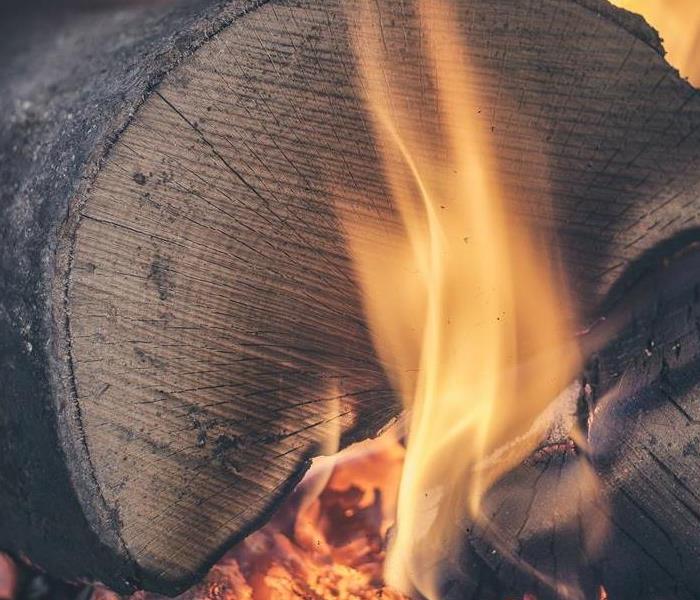 The Cleanup Process Begins with Identifying the Type of Smoke & Soot
The Cleanup Process Begins with Identifying the Type of Smoke & Soot
Not all smoke is created equal. Smoke and soot are the byproducts or residue of a fire. The type of smoke damage depends entirely on what burned in your home or business. In the blog below, we will cover the main types of smoke damage and how the smoke and soot residue is different.
Types of Smoke Damage
Wet Smoke
Wet smoke is one of the hardest to clean up and can easily make a mess. This type of smoke results from smoldering fires with a low temperature. The smoke is thick and sticky and smears easily if touched. It easily clings and builds up on walls, furniture, ceilings, and other surfaces. It is very difficult to clean up and it is always a good idea to contact a fire damage professional to clean it up. It also leaves a strong lingering odor if not properly cleaned up.
Dry Smoke
Dry smoke is usually much easier to clean up. It comes from much higher temperature fires like paper, wood, or synthetic materials. The smoke is usually less black and more powdery from paper and wood. With dry smoke, you have to worry about it penetrating small cracks and grooves in everything it comes into contact with. This can include wood, wallpaper, fabrics, carpets, wood floors, tile grout, and electronics. While it is easy to clean off of flat surfaces, if you don’t get it out of all the crevices and spaces, it will leave behind a stinky odor.
Protein Smoke
Protein smoke usually occurs in the kitchen as a result of food catching on fire in the oven or on the stovetop. Protein smoke also naturally occurs just from cooking and can build up on surfaces over time. The smoke is usually light in color and tends to discolor surfaces surrounding the cooking appliances like the ceiling, walls, and counters. The smell of protein smoke can be very strong and stinky especially from a large food fire in a kitchen. The smoke residue is also very greasy which makes it really difficult to clean. Cleaning up this residue requires professional cleaning materials that are made for protein-based smoke residue.
Petroleum Smoke
Petroleum smoke is usually the result of a fire from cooking oils or fuel oils. Petroleum smoke is very dark and thick. Due to the flammability of the oils, the smoke is usually pretty significant and can quickly fill up a room or home. It can easily discolor any surface it comes into contact with including ceilings, walls, and floors. It can also ruin any porous materials like furniture, flooring, and drapes if not treated quickly. Due to the amount of smoke residue it can cause and the difficulty in cleaning it, it is highly recommended that you contact a fire damage restoration company like SERVPRO of Indianapolis West.
Contact the Fire Damage Restoration Experts at SERVPRO of Indianapolis West
If you should suffer fire and smoke damage to your Indianapolis home or business, contact the fire damage restoration pros at SERVPRO of Indianapolis West. They have the equipment, knowledge, and experience to clean up and restore fire and smoke damage. Day or night, 24/7, they’re ready to answer your call and quickly clean up and restore fire and smoke damage to your home or business.
Preserving Your Property After A Fire
7/31/2019 (Permalink)
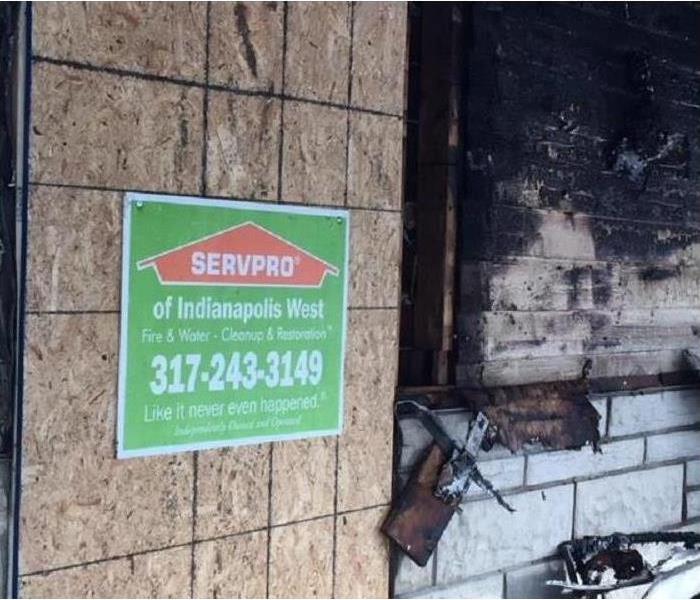 Securing Your Home or Business After A Fire
Securing Your Home or Business After A Fire
Two Terms You'll Hear After The Fire
Roof Tarping: The Fire Department will often vent the roof of a structure fire to help in their efforts to control and extinguish the blaze. To vent the roof, they use an ax or saw to cut a hole in the roof. We use a thick, weatherproof tarp to cover any holes in the roof to minimize secondary damage from precipitation or animals.
Board-Up: We use durable plywood to cover any broken windows or doors that cannot be locked, this is done to preserve the structure and to keep the home safe from possible break-ins and exposure to the outside environment.
SERVPRO, Faster To Any Disaster
Once the fire has been put out, it's essential to call us, SERVPRO of Indianapolis West as soon as possible. Even if it's in the middle of the night, we're available 24/7 to help to help. We are ready to take your call and take action no matter the time of day or night. Sometimes the fire department may need to break windows and cut holes in the roof to vent the house so that they can fight the fire properly. If that happens to your property, we can fully secure the structure even in the middle of the night. Call us at 317-243-3149, or click here, and we'll help you and your family get back the life you had before the flames took over.
Fast Action to Help Save Your Property
In many home fire situations, there may be damage to the exterior of the home that would cause the outside elements, like rain, to get inside. If windows have been broken, doors kicked in, roofs damaged or exterior walls damaged from the fire, we will first board up any windows or doors and cover any roof or wall damage with tarps to keep the elements from causing further damage to your home.
Protecting What's Inside Your Home
It's crucial to secure the structure shortly after the fire is extinguished. There are security and safety issues to keep in mind. The contents and personal effects of the homeowners need to be protected. By covering any broken windows or holes, we can keep out any weather elements or curious critters looking for a place to nest. After we complete the emergency board-up services, you can count on the experts at SERVPRO of Indianapolis West to fully restore your Indianapolis home or business.
4th of July Home Fireworks Safety Tips
6/25/2019 (Permalink)
 4th of July Home Fireworks Safety Tips
4th of July Home Fireworks Safety Tips
Top Fireworks Safety Tips at Home
It’s that time of year again. Time to compete with your neighbors to see who has the biggest and best fireworks display According to the National Fire Protection Association, more house fires are reported on the 4th of July than any other day with more than half caused by fireworks. So while you pull out your bottle rockets, mortars, roman candles, sparklers, and other highly explosive munitions to light up the night for your friends and family, it’s important to follow all safety rules and tips to keep yourself, your friends and family, and your home safe this 4th of July in the Indianapolis area. Below we’ve listed some of the top safety tips to follow to ensure you have a safe and happy 4th of July.
Keep Children Away. Designate a Fireworks Lighter.
There really isn’t any safe fireworks for kids. While many kids are given sparklers, they can reach temperatures up to 1,000 degrees and easily burn a child or cause their clothing to catch fire. Make sure that all children are kept a safe distance away from any fireworks that are being ignited. It’s a good idea to have adults supervising the kids while a designated adult is chosen to light the fireworks. With one designated fireworks lighter, you are less at risk of severe injuries and explosions as a result of too many people lighting fireworks off at the same time.
Keep Water and a Fire Extinguisher On Hand.
Even if you are following all of the fireworks safety tips, there is still a risk of accidents happening. This can be the result of faulty fireworks igniting prematurely. This can be the result of fireworks falling over and firing at property or people. A single firework can explode near the stored fireworks setting off an explosive chain reaction of destruction. This is why it is important to have buckets of water and fire extinguishers on hand in the event that a fire is started in your grass, in a tree, or on your home. It’s also a good practice to dispose of any spent fireworks in a bucket of water to reduce the risk of re-ignition or a secondary fire or explosion.
Close Your Garage Door. Be Aware of Your Surroundings.
If you are shooting off fireworks near homes like in a driveway or the middle of a cul-de-sac, make sure that garage doors, windows, and doors are closed. Not only do you not want smoke and debris from the fireworks to blow into homes, but you also want to reduce the risk of fireworks shooting through an open window or garage and exploding. It’s especially important to make sure you shut your garage doors before lighting off fireworks as there may be flammable liquids like gas and solvents stored in the garage that could potentially explode from an errant bottle rocket firing into your garage.
It’s also important to be aware of any cars, sheds, bushes, dry fields, trees, and other objects that could be at risk of catching on fire or exploding. If it has been especially dry, you need to be careful as to not shoot off fireworks around trees, forests, and fields that could catch on fire. This probably isn’t the case with the central Indiana area this year due to all of the rain but is still important to be aware of.
Douse Spent Fireworks with Water Before Putting in Trash
A small ember inside a large firework can slowly burn for hours without anyone noticing. If you throw that large firework in the trash and go to bed, you could wake up to a literal dumpster fire. If you store your trash cans inside your garage, the damage from a trash fire could be much worse. While you are shooting off fireworks, be sure to place all the spent fireworks in a single pile on the ground or in a metal container that won’t catch fire. Some people even throw them all in a bucket of water after they have been shot off. Before you clean up and dump all the spent fireworks in your trash, it is important to wet them down. You can spray them on the ground with a hose or soak them in a bucket of water to ensure they are completely soaked with water and there isn’t a chance they could re-ignite. Even the smallest of fireworks and debris could be hot enough to ignite something in your garbage.
Be Safe and Have a Great 4th of July.
Follow the steps above and be extra careful around fireworks and you and your family should have a safe and happy 4th of July. If a fire should start, whether it’s in your yard or your home, don’t try to be a hero. Have a cell phone handy and ready to call 911 if things get out of hand. If a fire should occur, you can trust the fire damage restoration experts at SERVPRO of Indianapolis West to help clean up the damage and restore your home. From all of us at SERVPRO of Indianapolis West, we wish you a Happy 4th of July? Have fun and be safe.
Electrical Safety Tips to Help Prevent House Fires
2/26/2019 (Permalink)
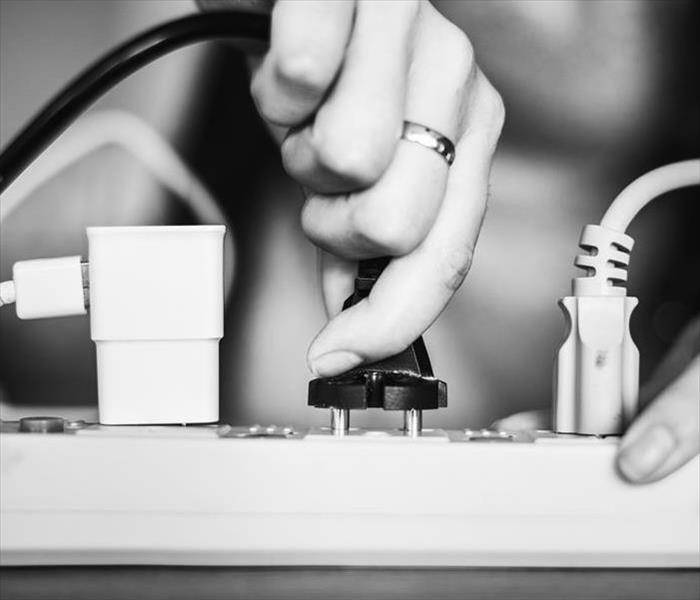 Electrical Safety Tips to Help Prevent House Fires
Electrical Safety Tips to Help Prevent House Fires
According to data from the NFPA, fire departments responded to an average of 45,000 home fires caused by electrical failure or malfunction every year between 2010-2014. In fact, home electrical fires are the most common fire in a home accounting for nearly 60% of all fires.
While you can’t prevent all electrical fires from occurring, there are a lot of things you can do to reduce the risk of an electrical fire happening at your Indianapolis home. Below we will cover some electrical safety tips you can follow that may help prevent an electrical fire from happening to you.
Protect Children from Exposed Outlets
If you have young children in your home, it’s important that you use child-proof outlet covers on unused receptacles. You can find outlet covers and tamper resistant outlets at your local hardware store. If you replace your standard outlets with tamper resistant outlets, be sure to hire a professional electrician to install them. Another tip to keep young kids away from outlets is to block access to the outlets using furniture like a couch or table or shelving.
Don’t Overload Outlets
Do you have an outlet that is powering a couple power strips and a dozen electronics? This can be dangerous. Don’t overload your outlets with too many powered electronics or appliances. Try to move some to another outlet. If you aren’t using an electrical appliance, like a blender or toaster, unplug it when you don’t need it. Overloading an outlet can trip the circuit or worse, it can lead to a fire.
Turn Off Appliances Before Turning Circuit Back On
If you do experience a tripped circuit from overloading an outlet or a power surge, be sure to turn off any appliances that the circuit is powering. Also, unplug anything that is powered by the circuit. Once you have flipped the circuit back on, you can then turn on the appliances or the electronics that the circuit is powering.
Check Cords and Plugs
Over time cords can kink, tear and fray. A small fray in a cord can cause sparks which can lead to a fire pretty quickly. Make it a habit of always taking a look at any cords or power outlets that you are near. Not only make sure that the cords are in good condition but that the plugs are plugged into the outlets all the way. A loose plug on an outlet can also cause sparks or a short which can cause an electrical fire.
Light Bulb Safety
Light bulbs are the most commonly used electrical item in a home. With light bulbs located in every room of your home, it’s important to follow a few tips to ensure they don’t become a fire hazard. Always use the recommended wattage of bulb for each fixture. Using a higher wattage bulb can cause the fixture to overheat. Be careful with light bulbs near curtains or other fabric. The fabric can be blown on top of the bulb which can quickly lead to a fire.
If You Should Suffer a Fire, Contact the Professionals
Following the above tips should help reduce the risk of a house fire, but it can’t eliminate the risk. If you should suffer from a house fire, call the fire damage restoration professionals at SERVPRO of Indianapolis West. They have the knowledge, expertise, and equipment to handle any size disaster. From fire damage to water damage to mold damage and more, they have the skills and expertise to clean up the mess, fix the damage, and return your home back to normal. Give them a call any time and any day for your fire, water and mold damage problems.
Space Heater Safety Tips
1/14/2019 (Permalink)
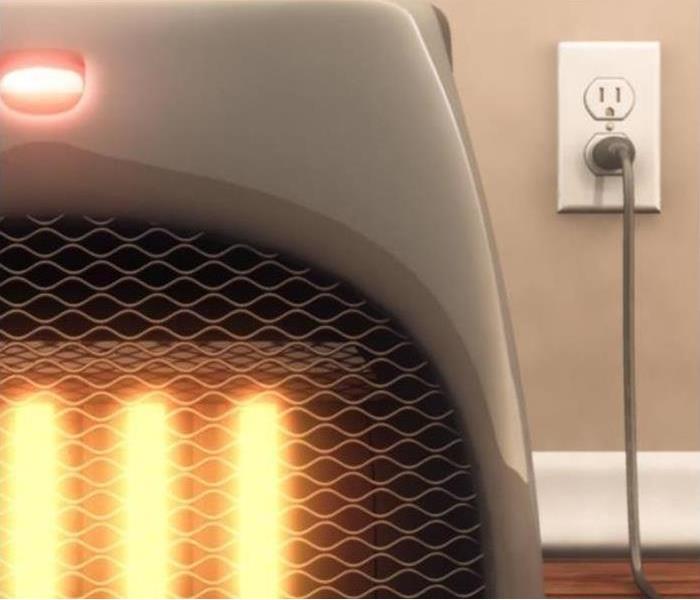 SERVPRO of Indianapolis West
SERVPRO of Indianapolis West
Unfortunately, each year many homes in Indianapolis catch fire causing death and serious injury to people. Some of these home fires are caused by space heaters and alternative heating methods. Often, these fires can be avoided with better preparedness and using greater caution.
One main reason space heaters produce fires, is that they're placed too close to flammable objects in the home, such as furniture, bedding, mattresses, and clothing. Wiring and insufficient maintenance is another top reason for heater malfunctions.
Dangerous & Convenient
Many people use space heaters to heat their homes or to warm areas that lack sufficient heat, like a bathroom or spare bedroom. Electric space heaters can help warm a room quickly. However, they can be as dangerous as convenient if used improperly.
Think Safety First
Caution should be used no matter what system or device is used to heat your home. Not all homes are equipped with a central HVAC system and alternative heating methods are sometimes needed, such as space heaters, wood-burning stoves, and fireplaces.
Things to Avoid When Using Space Heaters
Never use an extension cord or power strip with space heaters. Always plug them directly into a wall outlet. Space heaters pull a lot of power and can quickly overheat a power strip or extension cord which can result in a home fire.
Home Heating Safety Tips
1. NEVER use an oven or stove to heat your home.
2. Keep heaters away from where children and pets could play with them.
3. Space heaters and candles should NEVER be left unattended or used overnight.
4. If possible, only use space heaters that shut off automatically if tipped.
5. Place all heaters on a level, hard surface with a minimum of three to four feet clearance of any combustible materials.
6. Never place heaters in a doorway or in high-traffic areas where they can be tripped over or knocked down.
7. Test the batteries in your smoke alarms and carbon monoxide detectors.
8. Develop a fire escape plan and practice it with everyone who lives in the home.
9. Designate a safe place for everyone to meet away from the house if a fire was to occur.
Indianapolis Home Fire Safety Tips for Fire Prevention Month
10/17/2018 (Permalink)
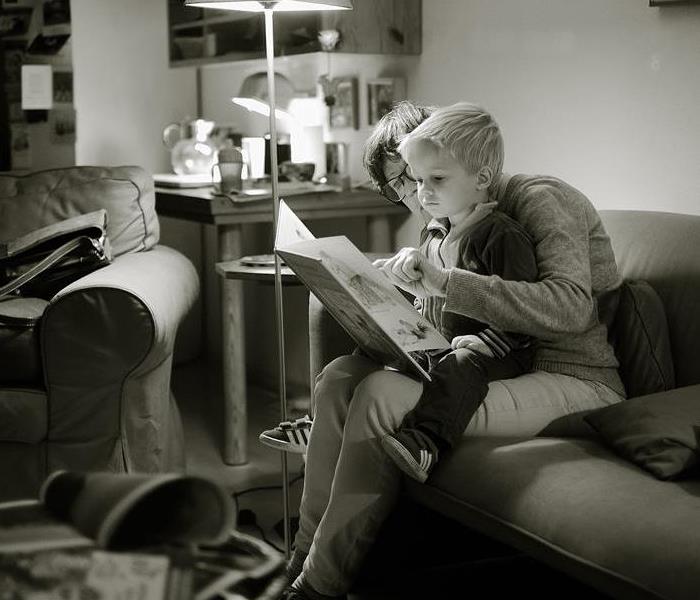 Indianapolis Home Fire Safety Tips for Fire Prevention Month
Indianapolis Home Fire Safety Tips for Fire Prevention Month
October is officially Fire Prevention Month and to recognize this month at SERVPRO of Indianapolis West, we’d like to offer these fire safety tips for your Indianapolis home.
Check Your Smoke Alarms
Your smoke alarms should be checked on a monthly basis, so if you’ve missed a few months then now is a great time to check them. Most smoke alarms have a button that you press and hold until they go off. If they do not go off, then replace the battery with a new one and test again. If it still doesn’t work, then purchase a new smoke alarm. Smoke alarms should be placed at every level of your home, in every bedroom, and outside every bedroom.
Practice a Fire Escape Drill with Your Family
It’s important to not only have a fire escape plan for your family but to practice it on a regular basis. Practice what to do if a fire should occur on every level of your home. You and your family need more than one escape plan. This could be running out through doors or climbing out through windows. When planning and practicing a fire escape plan, you also need to designate a meeting place outside the home where everyone will meet.
Clean Out Dryer Vent
While you should be cleaning the lint trap every time you run your dryer, you need to clean out the dryer vent tubing at least once a year. Your dryer vent is the tubing that runs from your dryer to the exterior wall where it exits out of your home. Over time, lint and dust can build up inside the tubing and eventually clog. Dryer lint is extremely flammable and if it is allowed to build up, the heat from your dryer can ignite it causing a fire. To clean out the dryer vent tube, you will most likely have to pull out the dryer and remove the tube. While this may take a little time, reducing the risk of a fire happening is worth it in the end.
Check Your Furnace Filter
With the cold season upon us, it’s important to check your furnace filter and replace it if it is dirty and clogged. With a clogged filter, your furnace will have to work overtime to heat your home during the cold season. This not only will increase your heating bill and put undue stress on your furnace, but it could also increase the risk of a fire occurring from the excess dust in the filter. When checking your filter, be sure to make sure your furnace and blower are turned off. Replacing the furnace filter is an easy and quick task that can save you money and reduce the risks of fire.
Check Your Electrical Outlets
If you have computers, televisions, and other electronics throughout your home; it’s a good idea to check all the plugs, wires and outlets for any potential problems. Problems that could lead to a potential fire include frayed wires, loose plugs, and overloaded outlets. These problems can cause sparks or overheating which can quickly cause a house fire. It’s also a good idea to dust off or vacuum up any dust and/or dirt around the outlets. While it’s not always ideal, you don’t want any fabrics or boxes covering up your outlets. Ideally, outlets should be clear of any potentially flammable materials like couches, curtains, storage boxes, stuffed animals, and mattresses.
Use Space Heaters Responsibly
With the cold weather upon us in Indiana, many of you may be pulling out the space heaters from storage and running them. Before you plug the space heater in, you want to check the cord, plug, and heater for any damages. If there are frays in the cord or broken parts on the heater, it’s best to toss it and get another one. Also, be sure to blow or vacuum out any dust in the coils and intake before starting it. Once you start the heater, you will want to observe it while it heats up to make sure it is operating properly. As far as placing your space heater in your room, you want to make sure there is plenty of space between the heater and any furniture, walls, and objects. When you leave the room, it’s always best to turn off the space heater to reduce the risk of a fire occurring. A blanket or drape blown onto the space heater can heat up very quickly and easily ignite within minutes.
When Fires Do Happen
Even with taking all the proper steps to prevent a fire from happening at your home, fires can happen. When they do happen, SERVPRO of Indianapolis West can help clean up the fire and smoke damage and return your home back to normal. Whether it’s the middle of the night or during a holiday, SERVPRO of Indianapolis West is available 24/7 for any home emergency fire cleanup and restoration. Hopefully, you’ve read and followed all the fire prevention tips above. These tips will not only help reduce the risk of a fire happening at your Indianapolis home, but they will also prepare you and your family on what to do if one should occur.
The Facts About Indiana House Fires
8/28/2018 (Permalink)
 The Facts About Indiana House Fires
The Facts About Indiana House Fires
With the recent strong storms, you may have seen stories on the local news about homes catching on fire from lightning strikes. While that is possible, lightning accounts for a very small percentage of house fires. Lightning is still dangerous and you should definitely take cover if it is near, there are other areas and parts of your home that you should keep an eye on as common culprits of Indiana house fires.
In the article below we will go over statistics on house fires as reported in the U.S. Fire Administration's National Fire Incident Reporting System (NFIRS) by the fire departments throughout the country. The stats come from the residential fire incident reports from 2013-2015.
Residential Fires are the Second Most Common Fire
Residential fires, which include single-family homes, apartments, and condos, account for 30% of all fires reported. Businesses account for 8% and vehicles account for 15%, while outside fires (forest fires, grass fires, etc.) accounted for 41% of all fires. While home fires accounted for only 30% of all fires, they resulted in the most injuries, deaths, and dollar loss from property damage.
The Leading Cause of House Fires
Have you ever left something on the stove for too long that resulted in a small confined fire? Apparently, many of us have by the stats from the U.S. Fire Administration’s report. Cooking fires accounted for an astounding 50% of all house fires that occurred between 2013-2015. Cooking fires originated in ovens, on stovetops, and in microwaves. Most of these fires were contained to the food container (skillet, pot, cooking sheet) and were extinguished before the fire had time to spread.
The second leading cause of house fires is from heating equipment. Heating equipment includes space heaters, furnaces, fireplaces, wood stoves, and radiators. These fires account for close to 12% of all house fires. These fires, like cooking fires, can be easily prevented by not leaving a fire in a fireplace or wood stove unattended and keeping flammable objects at least three feet away from heat sources. If you use space heaters, be sure to turn them off before leaving the room or going to sleep.
Other leading causes of house fires include appliance fires, candles, smoking, and electrical malfunctions. All of these together only account for 16% of all fires. Fires from smoking and candles are usually due to carelessness while appliance and electrical fires are due to damaged equipment or overloaded circuits. With appliances and electronics, it’s always good to check the cords for damage or frays. Also, never overload a wall outlet with an excessive amount of appliances and equipment.
The Spread of Fires in Homes
Fortunately, most fires in homes are discovered quickly and extinguished before they spread. Around 55% of all fires are contained to the object that the fire originated at. This could be a pot or an appliance or a piece of fabric like a table cover or chair. While the fire damage is usually limited to the object, the smoke damage can still be substantial. Fires that take over a whole room account for 20% of all fires while fires that take over a whole home account for 17% of all fires. These fires are the most devastating to property and to the health of the occupants.
Be Safe in Your Home with Working Smoke Alarms
One of the keys to catching a fire early and extinguishing it before it has caused extensive damage is to have properly working smoke alarms located throughout your home. According to the report, smoke alarms were only present in 43% of nonconfined house fires. Nonconfined fires are fires that spread from their original confined source i.e. cooking pot. While smoke alarms will not prevent a fire, they serve as an early warning device to alert the occupants that a fire is occurring. A smoke alarm gives them time to either extinguish the confined fire or evacuate and call the fire department if the fire is nonconfined.
It a Fire Should Occur at Your Indiana Home, Call the Fire Restoration Professionals
Even a small little kitchen fire can cause a lot of smoke damage. Whether you have experienced a small fire or an extensive fire, the fire restoration experts at SERVPRO of Indianapolis West can help clean up, repair and get your home back to normal as quickly as possible. They have the tools, equipment, and know-how to handle smoke damage, water damage, mold damage and fire damage -- all of which can occur from a house fire. Whether a fire happens during the day or in the middle of the night, you can call SERVPRO of Indianapolis West 24/7 to handle your home’s emergency.
Terms You May Hear After A Fire
7/26/2018 (Permalink)
 Call SERVPRO of Indianapolis West for fire and water cleanup and restoration.
Call SERVPRO of Indianapolis West for fire and water cleanup and restoration.
Industry Terms For Fire Damage
If you experience a fire, whether as a homeowner or in the commercial environment, you may hear many different terms you’re not familiar with. We’d like to familiarize you with some of the terms we use in the restoration industry, so that you can better understand what’s being said and what’s happening.
SERVPRO of Indianapolis West thrives on transparency and open communication for the Property Owner to better understand the restoration process. We will always communicate with you throughout the process, so that you feel comfortable with each and every step.
Fire Damage: This is a general term meaning that fire was the source of the loss.
IICRC Training and Certification: The Institute of Inspection Cleaning and Restoration Certification. The (IICRC) certifies and sets the standards for the cleaning and restoration industries. SERVPRO of Indianapolis West is an IICRC certified firm.
Stabilizing the Structure: This is typically done by the Fire Department after fighting the fire. We need to be sure the structure is safe for our technicians to begin the cleanup and remediation process.
Roof Tarping: The Fire Department will often vent the roof of a structure fire to help in their efforts to control and extinguish the blaze. To vent the roof they use an ax or saw to cut a hole in the roof. We use a thick, weatherproof tarp to cover any holes in the roof to minimize secondary damage from precipitation or animals.
Board-Up: We use strong plywood to cover any broken windows or doors that cannot be locked. This is done to preserve the structure and to keep the home safe from possible break-ins and exposure to the outside environment.
Secondary Damage: This is the damage created by the corrosive nature of substances released by the heat and fire. Often the secondary damages can account for the majority of damage to a home or business.
Pre-Loss Condition: This means to return the property to its original state before the fire or water damage occurred. “Like it never even happened.”
Demo or Demolition: When material has experienced permanent damage and cannot be cleaned or restored, it is then removed and disposed of but ONLY with the owners permission.
Air Scrubber: A portable filtration system that removes particles, gases and /or chemicals from the air within a given space.
HEPA Filter: HEPA stands for High Efficiency Particulate Absorber. An air cleansing machine.
Structural Damage: This is the damage that affects the core-integrity of your home or business. These areas consist of your roof, framing and load-bearing walls.
Contents: Imagine turning your house upside down and taking off the roof, anything that would fall out is considered contents. Furniture, clothing, and personal items.
Pack-out: When necessary our crews carefully remove all contents and move them to our warehouse where they are inventoried, cleaned and restored. This allows for better access to clean and restore the home and eliminates the possibility of secondary damage during the restoration process.
Common Damages to Indianapolis Homes After a Fire
7/24/2018 (Permalink)
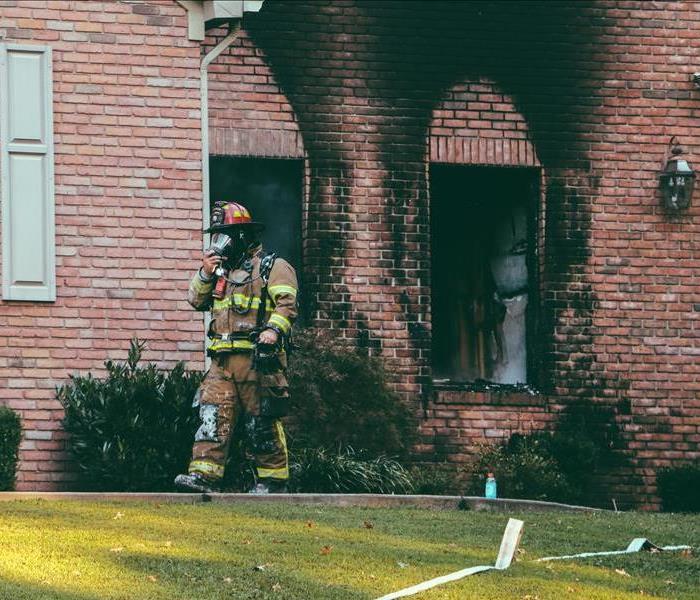 Common Damages to Indianapolis Homes After a Fire
Common Damages to Indianapolis Homes After a Fire
It’s usually not the actual fire that does the most damage to a home from a house fire. What causes the most damage to homes that suffered a fire is the smoke from the fire and the water from the firefighters. Below we will cover common damages that occur in a home after a fire.
Where You’ll Find Most Damage from a Fire
Obviously, you’ll find the most damage to a home at the source of the fire. In the case of a stovetop fire, this would be around the range hood, back wall, and ceiling above. In the case of a space heater igniting a curtain, the damage would be around the curtain and on the ceiling above the curtain.
While there will be flame damage right near the source, the majority of the damage will be from the smoke of the fire. If you’ve ever blown out a candle or roasted marshmallows over an open fire, you’ll know that smoke rises. When a fire occurs in your home, the smoke will also rise up and to the ceiling. If the fire is near a wall you might see discoloration up the wall with most of the discoloration right above the source of the fire on the ceiling.
As the fire continues to create more smoke, the smoke will spread across the ceiling and look for a place to escape and go higher. This could be up a stairwell or through ceiling vents. If the smoke has no place to go any higher, it will start to build up and start to come down closer to the floor like a fog. With smoke having the tendency to go up, this is why they say to get nearest to the ground when escaping a fire since there is usually less smoke.
The last area where you’ll most of the smoke damage from a fire is around windows and doors. As the smoke builds up in a house, it looks for the easiest place to escape outside. While this could be a chimney, smoke will also slip out through any cracks or drafts in windows and doors. In homes that suffer a lot of damage, you’ll usually find heavy discolorations around drafty doors and windows.
The Two Variables That Can Spread the Smoke Even Further
While we’ve discussed the typical behavior of smoke from a fire and where you’ll typically find the most damage, there are two variables that can change the behavior of the smoke and help carry it and the damage it causes even further throughout your home. The two things that can help spread the smoke even further are your ceiling fans and your central HVAC system. If your ceiling fans are on or your HVAC blower is on, then the smoke can be blown and carried throughout the house.
If your HVAC system is running then the smoke will most likely enter through the return vents and be spread throughout the duct system. This will not only carry the smoke and the smoke damage throughout the house, it will also cause smoke damage to your ducts. Your ducts might have dust throughout the system which can absorb the smoke meaning every time your air conditioner or heater turns on, you’ll smell the residual smoke for weeks and months after the fire. To remove the smoke from your ducts and HVAC system, you’ll need to have them professionally cleaned.
Battling Discoloration and Odor from Smoke
As you’ve read above, the most damaging part of a fire is usually the smoke. Smoke can discolor any surfaces it comes into contact with. This can include ceilings, walls, and floors but also furniture, clothes, toys, and other household objects. The smoke can seep through every little tiny crack and space discoloring everything in its path.
The second thing that smoke can do to many surfaces of your home is leave an odor. While surfaces that are smooth and not porous can be cleaned easily, the smoke odor can easily embed into porous surfaces like fabric furniture, clothes, curtains, carpets, sheets, electronics and non-sealed wood.
How to Clean Up Fire and Smoke Damage
Cleaning up after a fire, even a small one, isn’t as easy as cleaning up a spilled glass of liquid off the floor. Due to the chemical properties of fire and smoke, removing the discoloration can be difficult if not impossible in some situations. Removing the smoke odor can be even more difficult especially when dealing with electronics, fabric furniture, carpeting, and clothes.
The best step to take if you should regrettably experience a fire in your Indianapolis-area home is to call the fire damage repair and restoration experts at SERVPRO of Indianapolis West. They have the knowledge and equipment to remove all the fire and smoke damage and restore your home to how it was prior to the fire. They are a trusted leader in the restoration industry that business owners and homeowners have turned to for years restore and repair their property.
Reduce the Risk of Injury and Fire with These Fireworks Safety Tips
6/26/2018 (Permalink)
 Reduce the Risk of Injury and Fire with These Fireworks Safety Tips
Reduce the Risk of Injury and Fire with These Fireworks Safety Tips
It’s that time of year again when the warm summer night air is filled with the sounds of crickets, locusts, bird chirps, and Boom!..fireworks. While the 4th of July is only one day and one night, the lighting of fireworks seems to be a Summer long ritual. And with the lighting of fireworks comes the dangers of fireworks. From personal injuries to roofs on fire, there are a lot of risks when it comes to lighting and enjoying fireworks in the Summer.
In the article below, we will cover the dangers and associated risks of fireworks and how to reduce those risks. Every year, thousands of people injured and property is damaged due to fires. So whether you’re enjoying the fireworks or lighting them, be careful and be safe this 4th of July and beyond.
Fireworks are Fire Starters
According to the NFPA, fireworks start an average of 18,500 fire each year resulting in $43 million dollars in property damage. Many of these fires are preventable. When setting off fireworks, keep a safe distance from any structure like a home or building. Make sure you always have some water or an extinguisher on hand in case a fire happens. Many home and structure fires are a result of airborne fireworks, like Roman Candles, landing on roofs and structures where they can spark a fire.
Fireworks can also cause grass, brush and forest fires. If you live in an area that has been suffering a drought, it’s usually best not to light fireworks off as brush fires can start very easily. If you are lighting fireworks off the ground, do it on concrete or dirt rather than dry grass or fields. Brush fires can quickly get out of hand and lead to even further damage as the fires reach homes and vehicles.
Vehicle fires are another common risk when fireworks are being set off. Never shoot fireworks at a car or vehicle. Also, be sure that all vehicles are a safe distance from where the fireworks are being set off to reduce the risk of a stray firework or ember hitting a car. It’s also advisable to keep your car window and doors shut to prevent any stray ember from floating into your car and starting a blaze.
Fireworks Can Hurt You
While fireworks can be loud and beautiful and amazing, they can also be very painful and even deadly. In 2015, emergency rooms treated 11,900 people for injuries from fireworks. Many of these injuries were to arms and legs that resulted in third-degree burns but in the worst cases, people suffered lost fingers and severe damage to limbs.
When lighting fireworks, always make sure kids and adults are a safe distance away from the area where the fireworks are being set off. While kids love sparklers, the sparklers can very quickly burn kids and ignite clothing. The firework that is the most misused if the bottle rocket. Teens and even adults have been known to have bottle rocket wars where they aim the bottle rockets at each other. Over the years, this has resulted in a multitude of injuries including severe head and eye injuries.
The other common injury that hospitals see year after year is from people holding Roman Candles in their hands. Often the Roman Candles do not work as intended and instead blow up in the person’s hand resulting in severe injuries. If you do set off fireworks, always follow the directions and do not misuse them. Also, be sure that they are set off away from any people and aimed towards the sky. With a little common sense, you can have a safe and happy evening setting off and watching fireworks.
Some Final Tips for a Safe 4th of July
It takes just one firework and one mistake to ruin a night and someone's property or even life. Here are some quick tips to follow to ensure that you and your family have a safe and wonderful 4th of July:
- Always light fireworks away from people, buildings, and cars.
- Never set off fireworks inside.
- Keep some water or an extinguisher nearby.
- Never let kids play with fireworks.
- Use fireworks as intended.
- Never try to relight a bad or “dud” firework.
- Don’t launch fireworks towards people or structures.
- Don’t set off fireworks while impaired.
From all of us at SERVPRO of Indianapolis West, have a happy and safe 4th of July. While we are experts at fire damage cleanup and restoration, we hope we don’t have to use our expertise to restore a home or building because of someone misusing fireworks. Be safe and have a great Summer.
How to Get Smoke Out of Your Indianapolis House After a Fire
4/30/2018 (Permalink)
 How to Get Smoke Out of Your Indianapolis House After a Fire
How to Get Smoke Out of Your Indianapolis House After a Fire
Almost everyday homes throughout the Indianapolis area experience an accidental fire inside their homes. Many times it’s a kitchen meal gone bad with a flame up on the cooktop or something that is cooked “well done” in the oven. Sometimes it’s a candle that someone forgot to blow out before leaving the room.
Luckily, most of these fires are extinguished quickly and result in little damage from the actual fire. Unfortunately, the smoke from these fires is what causes the most damage to Indianapolis homes. So what is one to do if they should experience a fire in their home that causes a lot of smoke? Below we cover what to do and what not to do.
#1 Remove the Cause of the Smoke
Only do this if it is safe. If you have burnt something in the oven, take it to the nearest door and put it outside. The item is most likely extinguished but may continue to let off smoke for a while.
Do not put the smoking item outside if it isn’t extinguished completely and don’t take it outside if you have to go through several rooms to get outside. You want to isolate the smoke rather than spread it throughout your home. If you don’t remove the burned item immediately, do it once it has cooled down.
#2 Open All Nearby Windows
Wherever the smoke has occurred, you want to immediately open any nearby windows to allow the smoke to blow out and fresh air to flow in.
You don’t want to open windows in rooms or areas where there is no smoke because this could cause the smoke to flow throughout your home and exit the opened windows. Again, you want to isolate the smoke to the area it occurred which brings us to the next important step.
#3 Turn Off Any Ceiling Fans and HVAC System
To help reduce the smoke from spreading throughout your home, you want to turn off any ceiling fans in the affected area. You also want to turn off your HVAC unit as it can funnel the smoke through your air ducts and into the rest of your home. This can result in not only having to deal with smoke cleanup in other rooms but throughout your air ducts also.
If you have box fans, you will want to put these in your open windows and turn them on to pull the smoke out of your home more quickly.
#4 Wipe Down Any Solid Non-Porous Surfaces
If you have granite countertops or dishes or glass windows, you can wipe them down with a cleaning solution to remove any soot or burnt particulates that gathered on the surface.
Be careful about scratching glass or other easily scratchable surfaces if the soot is very grainy. Even the smallest of particles can cause a scratch if you aren’t careful. If you are worried about damaging a solid surface, always err on the safe side and have a professional smoke remediation expert clean it.
#5 Do Not Wipe Down Porous Surfaces
The smoke from the fire most likely caused some discoloration on the ceiling about the fire and on the walls nearby. The smoke could have also gathered in the corners of the room causing discoloration there.
While it may seem that wiping down the ceilings and walls would be easy to do, most people actually make it worse due to the porous nature of walls and ceilings. Rather than removing the soot and smoke discolorations, wiping it down could smear the soot and embed it further into the surface creating a bigger mess.
#6 Call the Smoke Damage Repair and Restoration Experts
If you have ceilings and walls and sometimes wood floors that are discolored from the smoke and soot, it’s best to call the smoke damage repair experts at SERVPRO of Indianapolis West. They have the tools and the expertise to safely and effectively remove the smoke damage and restore it back to new.
If you should suffer extensive smoke and/or fire damage, they can most definitely help get your home cleaned up, repaired and restored as quickly as possible. They have dealt with all types of fire and smoke damage, and are ready to help you if you need them.
What To Do After a Home Fire
1/22/2018 (Permalink)
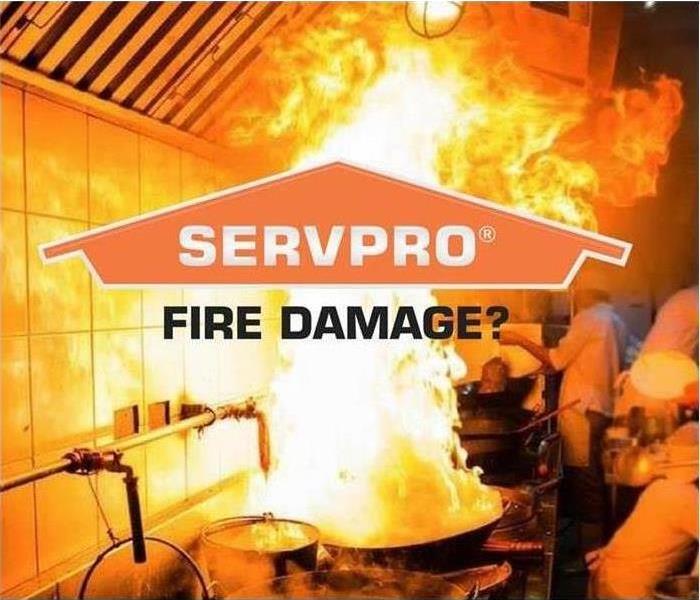 Indianapolis House Fire
Indianapolis House Fire
While we all hope we never have to suffer through the experience of a house fire, it is important to know what to do if one should happen. Obviously, the first thing you should do is ensure the fire has been extinguished completely.
This can be done by someone in the home if the fire is small and can be put out easily and safely. Or by the fire department if the fire is too big and dangerous to safely extinguish by the homeowner. It’s important to note that it’s always best to call the fire department right as soon as a fire is spotted and to get everyone out of the home quickly and safely.
The Fire is Out. Now What?
While you may be anxious to start cleaning after a fire, you may be doing more damage than good. Normal household cleaners can be ineffective at removing soot and smoke -- and could even make it worse. It’s best to contact fire damage repair and restoration professionals, like those at SERVPRO of Indianapolis West, to get advice on what needs to be done and what not to do.
Fire damage repair and restoration professionals will be able to tell you what can be cleaned, what can be repaired, and what needs to be replaced. They will be able to give you estimates on what services need to be done in order to remove all fire and smoke damage, including smoke odors, from your home.
Airing and Drying Things Out
One of the first things a fire repair company will do is get the smoke and moisture out of the air. This can be done with fans and dehumidifiers. Once the fire is out and you’re allowed to go back inside, you can open some windows near where the fire occurred to help start airing the smoke out of the house.
The other concern is water damage to your carpets and floors. This is usually a result of the fire department extinguishing the fire. If your carpets and floors are wet, it’s important to remove the water and moisture and quickly as possible. If not dried out, carpets and floors can occur further damage from mold and mildew.
Professional fire damage repair companies will usually vacuum out as much water as possible and then use fans and dehumidifiers to dry the carpets and floors out. They may also pull up the carpets to help dry out the padding underneath.
Battling Soot Before It Causes Worse Damage
Soot can be a huge menace to carpets, drapes, and upholstery. It can easily stain fabrics and cause further staining using standard cleaning materials. The soot must be removed before using fabric cleaners. It’s also important to limit traffic across carpet and floors that have soot on it.
Dealing With Smoke Odor In Fabrics
One of the most difficult things to get out of fabrics and porous materials is the smoke odor. Smoke odor can adhere to carpets, dust in air ducts, drapes, and furniture. Normal household cleaners and detergents usually won’t remove all of the smoke odors. To remove the smoke odors many times require special counteractants that are formulated to break up the smoke molecules in the fabrics and materials.
A professional fire repair company will be able to help with that. They will be able to apply these chemical and/or additive counteractants to carpets, fabrics and other porous materials to break up the smoke molecules. Once they are broken up, then they can be professionally cleaned.
Sometimes ozone treatments are needed to break up the smoke molecules and remove the odors. This is usually done with ozone generators which be dangerous if misused. Ozone treatments are another of many tools and treatments that a fire repair company will be able to help with if needed.
Treating Discolored Walls and Ceilings
Removing soot from walls and ceilings is another difficult task that is best left up to a professional. Professional fire damage repair companies will have the right tools and treatments to remove the soot without causing further damage or stains. Many will use special sponges to remove the soot. Others will use non-water based cleaners to remove the soot. Again when dealing with smoke and soot stains on walls and ceilings it’s best to consult a professional fire damage repair company.
Call the Fire Damage Experts for Fast Cleanup and Restoration
When dealing with fire and smoke damage, it’s always best to leave it to the experts at SERVPRO of Indianapolis West to handle the cleanup and restoration. The professionals at SERVPRO of Indianapolis West have the expertise and experience to handle home and commercial fire damage. If you should suffer from a fire, contact SERVPRO of Indianapolis West online or call them at 317-243-3149.
How Does Smoke Damage a Home’s Interior
1/21/2018 (Permalink)
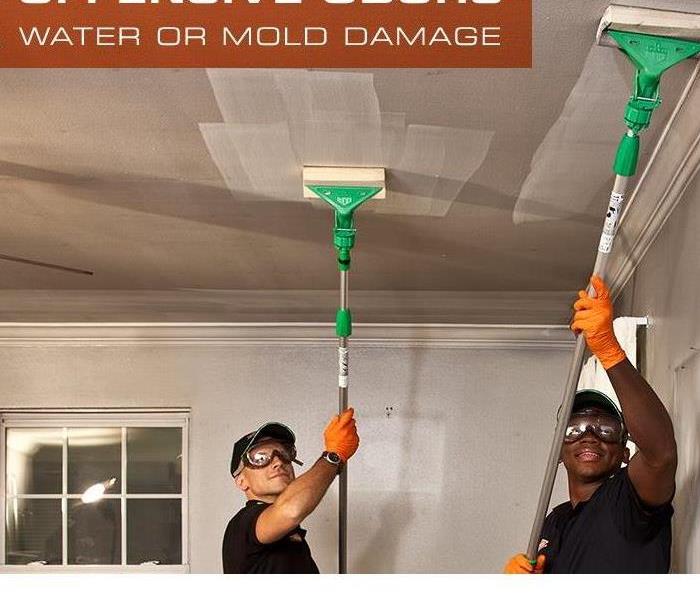 Cleaning Smoke Damage
Cleaning Smoke Damage
While the flames of a house fire can definitely be damaging to a home and can ultimately destroy a home, it is the smoke from a house fire that leads to the most damage in most house fires.
Most house fires are usually extinguished quickly either by the homeowner or the fire department resulting in minimal damage from the flames of a fire. For example, a common house fire that occurs quite often is a kitchen fire. This is usually a result of burning food in the oven or on the stovetop. These fires are usually put out very quickly resulting in minimal damage from the flames but a lot of damage from the smoke.
So how does smoke damage a home’s interior? What are the contents of smoke? How does smoke spread? And how do you remove smoke damage and odor from a home? Below we answer all these questions to help you better understand how smoke from a house fire damages your home’s interior and how to remediate it.
What Is In Smoke?
Smoke is made up of many particulates dependent on the material that is burning. It also contains aerosols and gases. The particulates can include carbon soot, dust, and fibers. The aerosols can include hydrocarbons like oils and tars. Gases in smoke can include carbon monoxide, hydrogen cyanide, hydrogen sulfide, and benzene.
When smoke comes into contact with your home’s contents, it can cause discoloration and odor. What you may not know is that the smokes ingredients can also cause further damage and degradation to your home’s contents over time. That’s why it’s important to call fire remediation professionals like those at SERVPRO of Indianapolis West.
Smoke Travels Quickly
The other damaging effect of smoke from a house fire is that is can travel far and also permeate many of your home’s contents like electronics, drywall, ceilings, fabric furniture, clothes, and carpets. As noted previously, the contents of the smoke can discolor and cause lasting odors in many of your home’s contents.
If you experience a small fire, it’s best to try to open a nearby window to air out the smoke to reduce the potential damages to your home. If you have a ceiling fan on, air conditioner running, or heater running, you may want to turn them off so the smoke isn’t carried throughout your home.
What To Do If You Experience A Fire?
As you can see, the smoke from a house fire can be particularly damaging to your home’s interior and its contents. Due to the nature of smoke being able to penetrate many of the surfaces and contents of your home, normal cleaning materials may not be fully effective. Residual smoke and soot can lead to lingering odors, discoloration of your walls and ceilings, and degradation of the internals of your electronics. That’s why it’s important to call the fire damage experts at SERVRPRO of Indianapolis West as soon as possible.
If you should suffer from a house fire, even if it’s a small kitchen fire, contact SERVPRO of Indianapolis West online or call them at 317-243-3149. The will clean up and restore the damage as if it never happened.
Top 8 Tips to Reduce Your Risk of Fire During the Holidays
11/20/2017 (Permalink)
 Top Tips to Reduce Your Risk of Fire During the Holidays
Top Tips to Reduce Your Risk of Fire During the Holidays
While the holidays are usually full of joy and happiness in homes throughout Indiana, they, unfortunately, are also at a higher risk of home fires.
Fires in homes are most common during the holidays and can quickly put on damper on the holiday mood. But there are things that you can do to reduce the risk of a fire happening in your home and causing extensive damage. This season, follow these top tips for a safe and happy holidays:
Keep Your Christmas Tree Watered
While Christmas tree fires are rare, they can cause extensive damage when they do. If you have a real Christmas tree, be sure to keep it watered the entire time. A dry Christmas tree can be engulfed in flames in less than a minute.Don’t Leave Candles Burning Unattended
Tis the season for candles of all kinds, all sizes, all fragrances. If you love the smell of a fragrant burning candle during the holiday season, always be sure to blow it out before leaving the room or going to sleep. Most candle fires happen in the bedroom where the homeowners fall asleep with a burning candle which ignites the curtains or bed sheets or burns downs and ignites the surface it was on. Never leave a burning candle unattended. Also, make sure the candle is far enough away from anything that can catch fire.Check Holidays Lights for Broken Bulbs and Frayed Wires
When hanging up the holiday lights, be sure to check the entire strand of lights for broken bulbs and frayed wires before hanging and turning them on. Older lights get much hotter than the newer LED lights, especially the larger ones, so be sure to keep them away from any flammable materials like fabrics or dry Christmas trees.Do Not Overload Electrical Outlets
With all the lights to hang, it’s easy to overload your electrical outlets. Most outside electrical outlets are ground-fault circuit interrupter (GFCI) outlets which will cut the power to the outlet if overloaded or there is an electrical short in the lights. If your lights are tripping the outlet, you may either have a frayed wire or a broken bulb or you are overloading the outlet with too many strands of lights. Overloading a non-GFCI outlet inside can lead to an electrical short and fire which is why it’s very important to never overload a single outlet with too many strands of lights.Keep Pets Away from Holiday Lights and Trees
If you have cats or dogs that like to climb and chew on things, be sure to keep an eye on them around your Christmas tree and holiday lights. An animal chewing on a wire or breaking a bulb could not only electrocute and kill your beloved pet but also cause a fire. If you do find them chewing on the wires or climbing through the tree, you might want to consider locking them in a safer room or training them not to mess with the tree or lights.Deep Fry your Turkey with Extreme Care
If you choose to deep fry your turkey this Thanksgiving or holiday season, do so with extreme care. Make sure the deep fryer is at least 10 feet away from your home and any structure. Make sure the deep fryer is on a flat surface where it won’t tip over easily. Have a fire extinguisher that is approved for grease fires nearby in case a fire does occur.Never Leave Your Kitchen While Cooking
Whether you’re baking cookies and holiday treats or preparing for a huge holiday dinner, your kitchen will probably be busy this holiday season. With so much happening in the kitchen during this festive time of the year, it should come as no surprise that kitchen fires are the most common house fire during the holidays. To reduce the risk of a kitchen fire, it’s always a good idea to have someone in the kitchen at all times when baking or cooking. Also, before you start cooking your big holiday meals be sure that you have a working fire extinguisher in your kitchen. When using your stove or cooktop, be sure that any flammable materials, like towels, are not near the hot surfaces.Test Your Smoke Alarms
Last but not least, walk test all of your smoke alarms. You want to be sure they are installed on every level of your home. It doesn’t hurt to install an extra one near your Christmas tree if one isn’t there. A smoke alarm can alert you quickly when a fire starts and can mean the difference between a little smoke damage and catastrophic damage.
If a Fire Should Occur, Call the Fire Damage Experts
While we hope this holiday season is a joyous occasion, if you should suffer a home fire or even suffer from smoke damage from a small kitchen fire, call SERVPRO of Indianapolis West immediately. The fire damage repair and restoration experts of SERVPRO of Indianapolis West have the expertise and equipment to quickly clean and restore your home as if nothing ever happened. You can contact them online or call them at 317-243-3149.
Top 10 Tips to Reduce the Risk of Home Fires
10/26/2017 (Permalink)
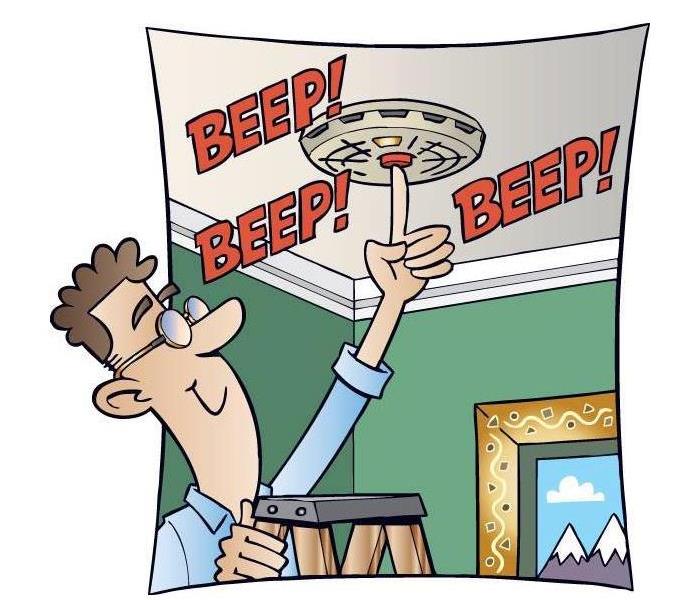 Top 10 Tips to Reduce the Risk of Home Fires
Top 10 Tips to Reduce the Risk of Home Fires
While October is Fire Prevention Month, there are many things you can do every month to reduce the risk of a fire happening in your Indianapolis home. We’ve compiled these top 10 home fire safety tips that you can follow now and throughout the year. If you do, however, suffer a home fire, you can call the fire damage repair and restoration experts at SERVPRO of Indianapolis West.
Top 10 Home Fire Safety Tips for your Indianapolis Home
1. Test Your Smoke Alarms Monthly
Hold down the test button and wait a few seconds for the alarm to activate. If it doesn’t activate, replace the batteries. Some of the newer smoke alarms have 10-year lithium batteries. These smoke alarms should be replaced completely every 10-years.
2. Install Smoke Alarms In Every Bedroom
If a fire should start in a bedroom where you are sleeping, you want a smoke alarm to go off as quickly as possible to increase the chance of escaping without harm.
3. Install Smoke Alarms at Every Level
Smoke alarms should be installed on every level of a home, including the basement. Beyond installing one on every level and in every bedroom, you should also consider installing smoke alarms in areas that are at higher risk of fire. These higher fire risk areas include a laundry room, kitchen and furnace room.
4. Keep Bedroom Doors Closed when Sleeping
If a fire should start outside your bedroom, you want to lower the risk of smoke inhalation by keeping your door closed while sleeping. By closing your bedroom door, the smoke alarm located nearest to the fire should wake you up before smoke has had a chance to infiltrate your bedroom.
5. Create and Practice Fire Escape Plan
If a fire should start at the bottom of the stairs, how will your family escape from a fire? If a fire is blocking the door, where do you go to escape? It’s important to not only create a fire escape plan but to practice it with your family.
6. Have a Fire Extinguisher in Your Kitchen
If a fire should start on your stove top, how will you put it out? It’s important to have a working fire extinguisher located in your kitchen. It’s best to place the fire extinguisher away from the higher risk fire areas like the oven and stove top.
7. Check and Clean Out Your Dryer Vent Annually
While it may be a pain to remove the dryer vent hose and clean it out, it can greatly reduce the risk of a fire from the accumulated dryer lint in the dryer vent.
8. Make Sure Your Chimney Damper is Open Before Starting Fire
With the cold weather upon us, many homes are lighting up their fireplaces for the first time this season. Before you strike the match or turn the gas on, make sure that your chimney damper is open. Too often, people light their first fire in their fireplace only to see smoke billowing out into their home causing extensive home damage.
9. Keep Candles One Foot Away from Flammable Materials
Candles are romantic. They’re also a common culprit of house fires. If you do light candles in your home, make sure that you keep them at least one foot away from anything that can burn. Also, never leave a room where a candle is burning without extinguishing it first.
10. Install Carbon Monoxide Alarms on Every Level of Home
Carbon monoxide is a colorless and odorless gas that can quickly kill you. By simply installing a carbon monoxide alarm on every level of your home, you can greatly reduce the risk of carbon monoxide poisoning.
What to Do If a Fire Should Occur
Even the small of home fires can cause extensive damage to a home. While the flames of a small fire may not cause much damage, the resulting smoke can quickly spread throughout the house causing smoke damage to furniture, clothes, electronics, carpets, and more.
If you should suffer from a house fire, it’s important to call the fire and smoke damage restoration experts of SERVPRO of Indianapolis West immediately. We will work right away to identify the steps to clean and restore your home while taking steps to prevent any unnecessary further damage from occurring.
Call SERVPRO of Indianapolis West at 317-243-3149 to start taking the appropriate steps to clean and restore your home.
How to Clean Smoke Damage on Walls and Ceilings from Your Indianapolis Home
8/31/2017 (Permalink)
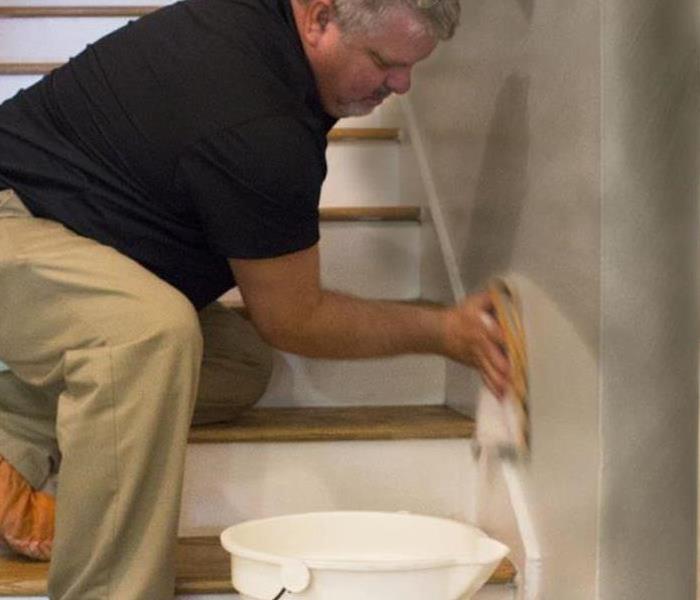 How to Clean Smoke Damage on Walls and Ceilings from Your Indianapolis Home
How to Clean Smoke Damage on Walls and Ceilings from Your Indianapolis Home
Cleaning smoke stains off walls and ceilings can be a difficult task. Even if the fire was minor like a cooking fire, the smoke can quickly discolor your ceilings and walls. Since smoke rises, the smoke usually damages your ceilings first as the smoke spreads across the ceiling leaving smoke residue. While smoke can usually be cleaned easily off metal and smooth surfaces like counters and ovens, ceilings and walls are not so easy to clean.
The Difficulty of Cleaning Smoke from Walls and Ceilings
The problem with smoke damage on walls and ceilings is that they are not completely smooth and usually quite porous. This means that smoke can penetrate the walls and ceiling making the removal and cleanup very difficult with standard cleaning supplies. With ceilings, many homes have textured ceilings like popcorn ceilings which make the cleaning even more difficult. Even if your ceilings are completely smooth and painted with glossy paint, cleaning them can be awkward leaving you with sore arms and a sore back before you’re halfway through cleaning them.
Smoke Spreads Quickly Through a Home
Even with a little great fire on your stove top, the smoke from the fire can spread quickly throughout your home beyond the kitchen walls and ceiling. If your central air conditioner or heat is running, the smoke can spread through the vents causing smoke damage in other rooms. The smoke residue can stick to the air ducts constantly reminding you of the fire every time your air conditioner or heater turns on.
The worst outcome is when smoke spreads to your furniture, drapes, clothes, carpets and other cloth items in your home. Getting smoke out of cloth fabrics can sometimes be as easy as washing them but most often require further commercial grade cleaning and deodorizing. Smoke can also penetrate electronics and appliances. With electronics, you can’t use any household cleaners or sponges as they will further damage the electronics. So what is one to do if you suffer smoke damage in your Indianapolis home?
How to Clean and Remove Smoke Damage from Your Home
Whether your home suffered extensive fire and smoke damage or just minor, the best thing to do is call professional fire damage restoration experts like those at SERVPRO of Indianapolis West. Using household cleaners won’t usually work and sometimes can make the damage and stains even worse. At SERVPRO of Indianapolis West, they have the experience, expertise, commercial grade cleaners and tools to properly and effectively remove any fire or smoke damage and restore your home as if nothing ever happened. Call SERVPRO of Indianapolis West today at 317-243-3149 to learn how we can help with fire, smoke, water and mold damage.
How To Get Smoke Odor Out of Fabric
5/17/2017 (Permalink)
 How to get smoke out of fabric.
How to get smoke out of fabric.
If you suffered a fire in your home, then there’s a good chance that some of your fabric furniture smells like smoke. With harder, nonporous surfaces, you can usually remove the smoke odors with cleaning solutions. You’ll find removing smoke odors much more difficult when dealing with more porous surfaces like fabric couches, clothes, and rugs. So how does one remove smoke odors from porous surfaces like fabric furniture?
The Baking Soda Method
Using baking soda to eliminate smoke odors seems to be a popular method. The idea is to sprinkle baking soda onto the surface and the baking soda will absorb the odors. While this may work with surface odors, this doesn’t work well to get deep-seated smoke odors out of the foam cushions of sofas and the carpet pads under carpets.
Airing It Out
Another popular remedy to get the smoke out is to set the furniture or rug out in the fresh air. While this may work for a rug or thin fabric, it most likely won’t help with sofas and fabric furniture. Also due to the chemical nature of smoke, airing it out won’t cause the smoke particles to break down and the smoke odor to go away.
The Best Way to Remove Smoke Odor
If you are looking for the best and only way to remove smoke odor from fabrics and porous surfaces, then you will want to call a professional fire and mold remediation company like SERVPRO Indianapolis West. The professionals at SERVPRO of Indianapolis West have a machine called an ozone generator. An ozone generator creates ozone which is able to permeate porous surfaces and oxidize the substances that are causing the odor. An ozone generator creates a high level of ozone which is dangerous to humans which are why they are only used by professionals in unoccupied spaces like a sealed room or an empty house.
If you should suffer a house fire or have smoke or cigarette odors that you want to remove from your furniture or home, call the fire cleanup experts at SERVPRO of Indianapolis West at 317-243-3149 for 24-hour emergency service. At SERVPRO of Indianapolis West, we have specialized equipment, professional training, and certifications that allow us to restore your home to its pre-fire condition.
How to Clean Up After A Fire
4/16/2017 (Permalink)
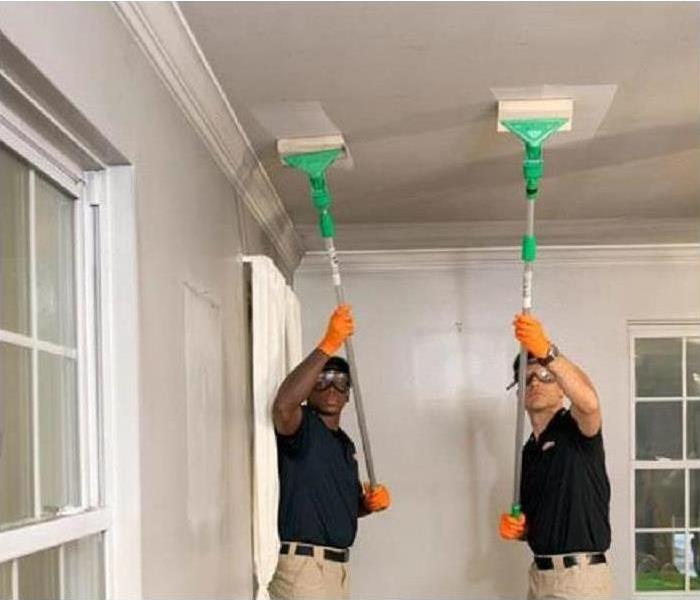 House Fire in Indianapolis
House Fire in Indianapolis
Unlike a broken pipe or a flooded basement, a fire in a home presents a unique and challenging situation when faced with restoring a home to its preloss condition. When a fire happens in a home, not only do you have the fire causing damage but there's also smoke and often times water damage from the fire department. At SERVPRO of Indianapolis West, we have a proven fire damage restoration process that we follow to ensure every fire no matter its size, is handled quickly and professionally in order to return things at home back to normal as fast as possible.
Time is of the Utmost Importance
Once the fire has been put out, it’s important to call us, SERVPRO of Indianapolis West as soon as possible. Even if it’s in the middle of the night, we're available 24/7 to help. We are ready to take your call and take action no matter the time of day or night. Sometimes the fire department needs to break windows and cut holes in the roof to vent the house so that they can fight the fire properly. If that happens to you we can properly secure the structure even in the middle of the night. Call us at 317-243-3149 and we'll help you and your family get back the life you had before the flames took over.
A Close Examination of the Fire
Examining the damage a fire has caused to a home requires experience and discipline. With a fire, you have smoke and soot that can easily move from the source of the fire to the rest of the home. It can travel through doorways, stairwells, and the duct work. It can also get into every little crack and crevice in your home from outlets, sockets, lights, and behind, under and on top of every piece of furniture and appliance.
When our fire restoration experts first arrive at your home, they will start from the source of the fire and examine every inch of your home as they fan out away from the source. If the air conditioner or heater were running during the fire, this can quickly cause the smoke and soot to be carried throughout the home. Our experts will know what to look for from years of experience in order to layout a plan of action to ensure every piece of evidence that a fire has occurred is completely gone.
Protect Against the Elements
In many home fire situations, there may be damage to the exterior of the home that would cause the outside elements, like rain, to get inside. If windows have been broken, doors kicked in, roofs damaged or exterior walls damaged from the fire, we will first board up any windows or doors and cover any roof or wall damage with tarps to keep the elements from causing further damage to your home.
The Water Has Got to Go
If the fire department was called to the fire and they had to use their trucks or hydrants to put out the fire, then you will be dealing with a lot of water damage. To keep the water from stagnating and causing mold in your home, our experts will extract the water from your home, treat any damp areas to prevent mold from growing, and employ industrial drying fans and dehumidifiers to remove all the moisture from inside your home. This step is crucial as black mold can quickly grow in situations like this causing even further damage to your home as well as being a health hazard.
Getting the Smoke and Soot Out
The next step that is taken is to clean up all the surface areas of the home that have smoke and soot damage. At SERVPRO Indianapolis West, we use special equipment and solutions to remove even the most stubborn of smoke and soot. We are highly trained to recognize smoke migration patterns and identifying the proper cleaning process to best fit each and every individual case. The smoke and soot damage can easily spread along the ceiling and through the duct work. You don’t realize how much surface area there is in your home until you have to clean every inch of it due to smoke and soot damage.
Cleaning Up the Small Stuff
Take a look around the room you are in now. Every single item that you see would most likely have to been professionally cleaned and sanitized to remove any signs that a fire happened nearby. With upholstery and fabrics, the smoke odor can sometimes be removed with special equipment that creates a gas that is able to break down the smoke molecules and remove the odors. This usually requires us taking the furniture to our facility where we can safely do this. For other items like wood furniture and other solid surfaces, we can usually scrub these down and sanitize them. For electronics, due to the many circuit boards and wires inside them, they are very sensitive to high heat and soot residue and can sometimes be difficult to fully restore.
Finishing Touches
If the fire caused any damage to floors, ceilings or walls that we couldn’t clean up or restore then our experts will replace them. This can be anything from drywall to carpets to cabinets to new flooring or ceilings. Our mission is to restore your home as if nothing ever even happened. A home fire is something we hope no one ever has to experience but if they do, then we will make it "Like it never even happened."
If you should suffer a house fire, call the fire cleanup experts at SERVPRO of Indianapolis West at 317-243-3149 for 24-hour emergency service. At SERVPRO of Indianapolis West, we have specialized equipment, professional training, and certifications that allow us to restore your home to its preloss condition.
Tips to Reduce Risk of Fire in Your Indianapolis Home
10/16/2016 (Permalink)
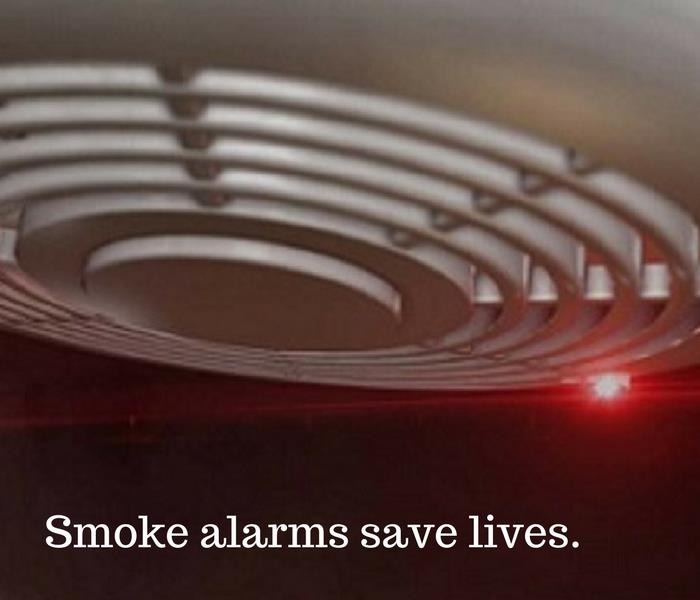 Reduce Risk of Fire In Your Indianapolis Home
Reduce Risk of Fire In Your Indianapolis Home
October is recognized as Fire Prevention Month. As part of Fire Prevention Month, SERVPRO of Indianapolis West would like to offer helpful tips to reduce fire risk at your home.
Home Fire Statistics
According to fire experts, families has as little as 2 minutes to escape a house fire while most families mistakenly believe that have at least 5 minutes or more to escape a house fire. That is why it is so important to exit the house quickly once a fire has been realized.
Only 69% of parents believe their children know what to do or how to escape if a house fire occurs. Less than half of all parents with young children have talked to their families about fire safety and over 70% have not identified a safe place to meet outside the home in case of a fire. Over 80% of families have never practiced home fire drills.
As you can see, the statistics are alarming but by taking a little time this month, more families can be prepared in case of a house fire. By talking with your kids about fire safety, where to meet in case of a fire, and how to escape when a fire occurs; you can greatly increase the chances of surviving a fire.
Home Fire Safety Checklist
1. Create an Escape Plan & Practice
Work with your family to create an escape plan in case of a fire. Practice your escape plan with your children. Also, plan alternative escape plans in case the fire is blocking an escape. Be sure to practice a fire drill with your family and check your escape time.
2. Check Smoke Alarms
Take a few minutes to test all of your fire alarms. Make sure they all are properly working and have batteries. Most smoke alarms have a test button that you can depress to test if it works properly. Also, if you have carbon monoxide detectors, be sure to check them too. Change the batteries in your smoke alarms every year unless they are a long-life battery. It's also a good idea to test the alarms once a month.
3. Check Fireplaces, Space Heaters, and Baseboard Heaters
With the colder months approaching, you'll most likely be using your fireplace or heaters to warm your home. If you use space heaters, make sure to place them away from anything that could be flammable like curtains, blankets or furniture. This goes for fireplaces and baseboard heaters too. Experts say that a heat source should be at least 3 feet away from the heat source.
4. Be Safe in the Kitchen
Kitchen fires are one of the most common fires in homes. To reduce the risk of fire, never leave anything cooking or baking unsupervised. When frying, grilling or cooking on an open flame, keep dish rags and other flammable materials away from the burners. If you are cooking with oil, be careful not to splash or spill the oil near the burners as it can quickly flame up. It's also advisable to have a working fire extinguisher located in your kitchen in case of a small fire.
5. Be Smart and Be Prepared
By following these tips, you can reduce the risk of fire in your family's home. If a fire does occur, you can greatly increase the risk that your whole family escapes safely by planning an escape and practicing fire drills on a regular basis. This October during Fire Prevention Month, ensure your home and family are safe and are prepared in case of a house fire.
If you should suffer a house fire, call the fire cleanup experts at SERVPRO of Indianapolis West at 317-243-3149 for 24-hour emergency service. At SERVPRO of Indianapolis West, we have specialized equipment, professional training, and certifications that allow us to restore your home to its pre-fire condition.
Top Causes of Indianapolis House Fires
8/24/2016 (Permalink)
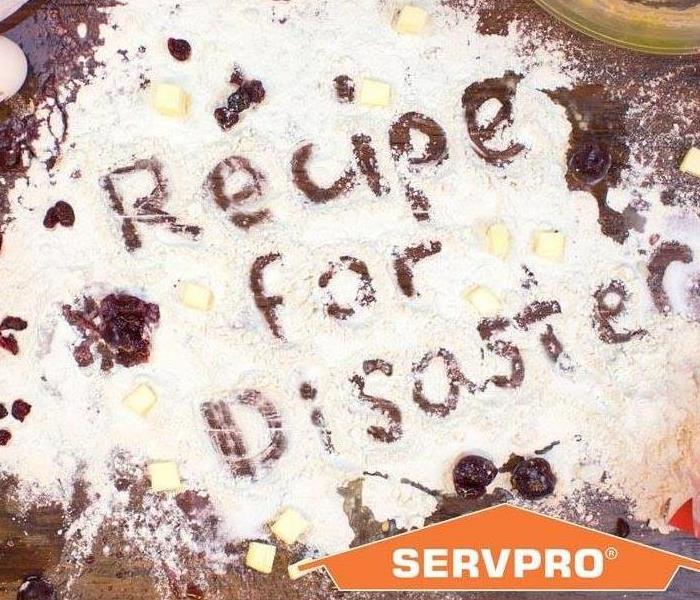 Cooking is the number one cause of house fires.
Cooking is the number one cause of house fires.
Below you will find some of the top causes of house fires in the Indianapolis area. Many of these causes can greatly be reduced by following a few common sense tips that we point out below.
1. Arson and Intentional Fires
According to the NFPA, around 282,600 intentional fires occurred between 2007-2011. Homes and other structures accounted for 18% of these fires. According to the data, most home arson fires occur between 3PM and midnight. Bedrooms are where most of the fires originated.
2. Candle Fires
Candles accounted for 9,300 home fires between 2009-2013 or 3% of all house fires. These fires resulted in 86 deaths, 827 injuries and over $374 million in damage. Candle fires occur most often on Christmas, New Year's Eve, and New Year's Day. To reduce the risk of a fire from candles:
- Don't use candles in bedrooms or areas where you may fall asleep.
- Never leave a candle burning unattended.
- Keep candles at least a foot away from anything that can catch fire.
3. Cooking Fires
Cooking is the number one cause of house fires and injuries. Most fires resulted from the cook leaving or being distracted from what they are cooking. Over 66% of cooking fires started with the food and cooking ingredients. This could be cooking oil catching fire or cookies or other food igniting from being overcooked. Frying foods with oil was the biggest cause of cooking fires. The number one day that cooking fires occurred was Thanksgiving. To reduce the risk of cooking fires, never leave any cooking unattended. Be careful when using oils not to splash or spill them onto the cooking surface. If a fire does occur, have a working extinguisher in the kitchen to quickly put out any small cooking fires.
4. Electrical Fires
Between 2007 and 2011, 47,820 home fires were the result of an electrical failure or malfunction. Electrical fires resulted in 455 deaths, 1,518 injuries, and $1.5 billion in damage. Bedrooms, attics, and kitchens were the leading areas of a home where the fires started. While lightning accounted for almost half of all electrical home fires, appliances like washers and dryers were the other major cause of electrical fires. To reduce the risk of electrical fires:
- Replace any damaged electrical cords.
- Don't run extension cords under carpet or in high traffic areas.
- Make sure your outlets have tamper-resistant covers if you have small children.
5. Heating Fires
There were 56,000 home heating equipment fires between 2009 and 2013. Half of them occurred during the months of December, January, and February. These fires resulted in 470 deaths, 1,490 injuries, and over $1 billion in damage. To reduce the risk of home heating equipment fires, keep anything that can burn at least 3 feet from fireplaces, space heaters, wood stoves, furnaces and other home heating sources. Never leave a space heater unattended as they account for the majority of all home heating equipment fires. If you use a fireplace to heat your home, make sure you clean the chimney regularly to prevent build up of creosote.
Reduce the Risks
As you can see, there are many causes of house fires. While the risk of arson can't necessarily be reduced, the other factors can. The most important factor in reducing household fires is to always be aware of potential causes of fires. If you are cooking, pay attention and never leave the kitchen unattended. If you use candles, blow them out when you leave the room. If you use a space heater, don't leave it running unattended and keep any combustibles away from it. Simply being aware of fire risks can go a great way to reducing the potential for a house fire.
Reducing Fire Risks in Your Indianapolis Home
6/11/2016 (Permalink)
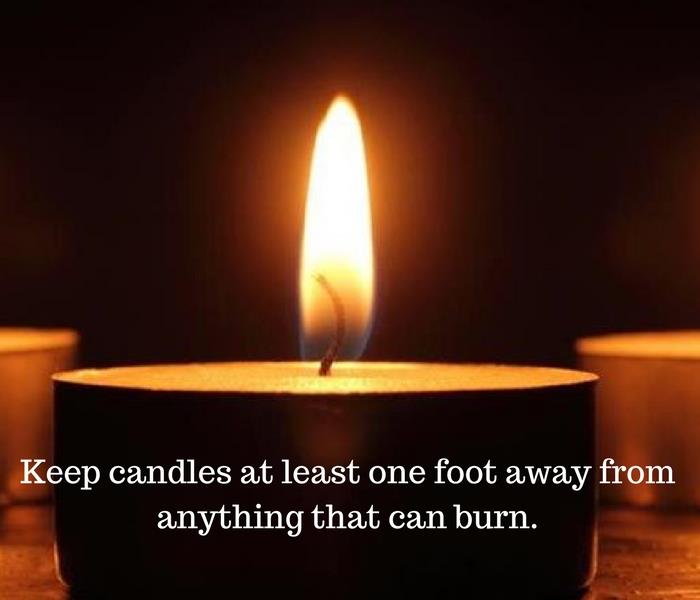 Candles are one of the leading causes of house fires.
Candles are one of the leading causes of house fires.
Fire can do substantial damage to your home. While the actual fire can be the most destructive, the smoke and the water can also cause lots of damage. At SERVPRO of Indianapolis West, we're experts at fire damage cleanup, repair, and restoration. We have restored countless Indianapolis homes that have suffered from fires. And many of those fires could have been easily prevented by avoiding these common causes:
1. The Beauty and Danger of Candles
Candles are one of the leading causes of house fires. Most happen as a result of forgetting to extinguish the candle when leaving the room it is in. If you do light candles in your home, never leave one unattended. Even leaving for a minute to answer the door or go to the bathroom is enough time for a candle to ignite a material nearby. Be sure to keep candles away from curtains, papers, and other flammables. Also, don't place them where kids or pets can knock them down. The best advice is not to light candles in your home, but if you do, take the necessary precautions.
2. Something is Burning in the Kitchen
We've all burnt dinners and food in our kitchens. But there are some steps to take to make sure a burnt dinner doesn't turn into a burnt kitchen. When cooking on the stovetop, make sure towels, window curtains, and other flammables are not near the heat source. When cooking with oil be extra careful not to spill any near the heat source. Oil and grease fires are the most common in the kitchen. Never use water to put out an oil or grease fire. Always have a working extinguisher in your kitchen in the case of small fires. It's a good idea to check your extinguisher ever 6-months to make sure it is still in working condition. When using a fire extinguisher on a grease or oil fire, stand far enough away from the fire so that the extinguisher doesn't blow the oil or grease further spreading the fire. Never leave the kitchen when cooking with any heat source including the microwave. Many kitchen fires could have been prevented if the person had not left the kitchen.
3. Space Heaters Turn Into Space Fire Starters
Space heaters are one of the most common causes of house fires in the winter. While many space heaters have built in safety features, they can still be dangerous. If you have a space heater, never leave it turned on when you are away from your home. When using a space heater, keep it away from flammable items like couches, beds, curtains and carpets. Also, place them away from high traffic areas where they may get bumped or knocked down. It's not a good idea to have a space heater running while you are asleep. An extra blanket is a much better and safer choice over a space heater.
4. Smoking is Bad for Your House's Health
Cigarettes and cigars that aren't completely extinguished are a major cause of house fires. If someone smokes in your house, make sure there is a large ashtray to ash and/or put out the cigarette or cigar. Also, make sure it's cleaned on a regular basis to reduce the risk of catch old butts or cigars on fire in the ashtray. Try not to smoke where a cinder or dropped cigarette could cause a fire like on a bed or couch.
5. Check Your Fire & Carbon Dioxide Detectors
Walk around your home today and test every fire and carbon dioxide detector. Make sure there is a detector in every major room and area of your home. While you can take steps to reduce the risk of fire, you can't reduce them all. Which is why it's important to have properly installed and working fire and carbon dioxide detectors in your home. If there is a fire, a detector can save your life and reduce the fire damage to your home.
Have fire, smoke or water damage? Call us at 317-243-3149 for 24-hour emergency service. At SERVPRO of Indianapolis West, we have specialized equipment, professional training, and certiications that allow us to restore your home to its pre-fire condition.
How to Get Soot & Smoke Odor Out of Indianapolis House after Fire
4/14/2016 (Permalink)
 Indianapolis Kitchen Fire & Smoke Repair
Indianapolis Kitchen Fire & Smoke Repair
Even the smallest of kitchen or house fires can be destructive. While the actual fire damage may be easy to fix, the smoke damage can be very difficult to remove. While there are some DIY and home remedies that might work, the best choice is to always call the professionals at SERVPRO Indianapolis West. We have dealt with hundreds of house and commercial fires in the Indianapolis area and know all the tricks, treatments, and tools to remove the most stubborn soot, smoke odor, and fire damage from your home.
But what if you were hanging out at a campfire or in a smoky restaurant or your kitchen walls behind your oven are a little dingy from too many burnt meals; there are a couple home remedies that we've found scouring the internet that may work.
The Power of Vinegar
It seems like vinegar is a solution for many problems in the home. It works great to unclog a coffee maker. It's also mentioned often to remove odors like smoke from fabrics. Most people recommend diluting vinegar with water and using a soft cloth to wipe any surfaces that can't be washed like leather jackets. For clothes, it seems that adding a little vinegar to the wash will help remove the odors. Vinegar and water will supposedly also help remove odors like mildew or smoke from books although that seems to have mixed results.
The Power of Baking Soda
Another popular product in the kitchen that seems to have hundreds of uses is baking soda. Baking soda does a good job of absorbing odors and can be used on carpets and furniture. It can also be used in stinky shoes, closets, hampers, litter boxes and wherever else smelly odors may linger. It won't get rid of smoke from most house fires, but it may help make your teenage son's room more tolerable.
The Power of SERVPRO of Indianapolis West
The most important step to remove soot and smoke odor from a home after a fire is to thoroughly clean or replace all the belongings and parts of the home that came into contact with the smoke. While the fire may have been minimal, the smoke and soot can easily travel throughout your home and throughout the ductwork of the home. And if you don't get every wall, every ceiling, every nook and cranny professionally cleaned the smoke odor can linger and possibly continue to spread over time. One professional tool that we use to break down and eliminate smoke odor is a commercial grade ozone machine. The ozone machine creates ozone that travels through the air and breaks up the smoke molecules.
If you have experienced a house fire or are just having odor issues in your home or office , give SERVPRO Indianapolis West a call and we will thoroughly clean and deodorize it. For more information about our fire damage repair and restoration services you can visit our Fire Damage Repair & Restoration page or to get help online visit our Contact Us page.
Cleaning Up from Fire Damage in Indianapolis
3/22/2016 (Permalink)
Even a small fire can be devastating for an Indianapolis home or business. A little grease fire in the kitchen can produce smoke and soot that spreads throughout the house sticking to everything in its path. The fire damage can be overwhelming but as long as everyone got out safely, your home or business and all your possessions can usually be replaced or cleaned. So once the smoke has cleared and the fire has been extinguished, what should you do?
The first thing you need to do is call your insurance agent to start your claim for the fire and smoke damage. You should work with your agent in hiring a professional Indianapolis cleaning and restoration company like SERVPRO of Indianapolis West.
We specialize in fire and smoke restoration and can quickly access the damage and stop any further damage from happening. For instance, ash and smoke not only leave a strong odor behind but can also cause corrosion and etching that needs to be stopped before it becomes an even bigger problem.
We will work with you and your agent to create a fire and smoke restoration plan that will quickly restore your Indianapolis home or business. When it comes to fire and smoke damage, timing is of utmost importance. So call your insurance agent and then call us if you live in the Indianapolis area including Avon, Plainfield and Brownsburg.
Now that you know what to do, here are a few things you shouldn't do right after a fire.
- First and foremost, make sure you have permission from the fire department to enter into your home after the fire is extinguished.
- If you have any electronics that were exposed to the fire or smoke, do not try turning them on. Not only could you be electrocuted or cause a new fire, the smoke and ash could cause further damage to the internals. We can examine your electronics and determine whether they can be professionally cleaned and restored.
- Do not take or use clothes that have smoke odors from the fire. The odors can be transferred to your car's upholstery or to the home or place where you take them.
- Don't try cleaning any walls, surfaces, fabrics, carpets or furniture as you could cause further damage. Smoke and ash require specialized cleaning solutions, tools and processes to remove. It's best to leave everything untouched and wait for us to arrive to assess what can be cleaned and what needs to be replaced.
If you have questions about certain possessions or cleaning processes, we will be happy to answer them for you. We know a fire can be devastating and our highly trained restoration specialists will work hard to get your home or business and your life back to normal as quickly as possible.






 24/7 Emergency Service
24/7 Emergency Service



































